
Water Supply, Sanitation and Urban Water Management (WSU)
We provide smart solutions for Water Supply, Sanitation, Urban Water Management and other cross-cutting issues

We provide smart solutions for Water Supply, Sanitation, Urban Water Management and other cross-cutting issues
WSU division provides consultancy services in Water Supply, Sanitation, and Urban Water Management to support the planning, design, and implementation of sustainable and climate-resilient water systems. Services in the water supply sector include feasibility studies, water demand assessment, source development, treatment plant design, hydraulic modeling, distribution network planning, NRW reduction, and preparation of detailed designs, cost estimates, and bidding documents. Construction supervision and commissioning support are also provided to ensure quality and performance.
Sanitation consultancy services cover sewerage systems, fecal sludge management, wastewater treatment plants, sanitation master planning, and environmental and social assessments to safeguard public health and the environment.
Urban water management services adopt an integrated approach linking water supply, sanitation, drainage, flood management, solid waste management, sustainable urban planning, environmental and social impact assessment (ESIA), environmental and social management framework (ESMF), master plan, pre-feasibility studies, sustainable design of roads, bridges, and drainage network, and climate change adaptation as well as operation and maintenance of urban water system. This includes integrated urban water management planning, flood and drainage modeling, resilience assessments, asset management, and capacity building of utilities. These services help cities achieve safe, efficient, and sustainable urban water and management services.
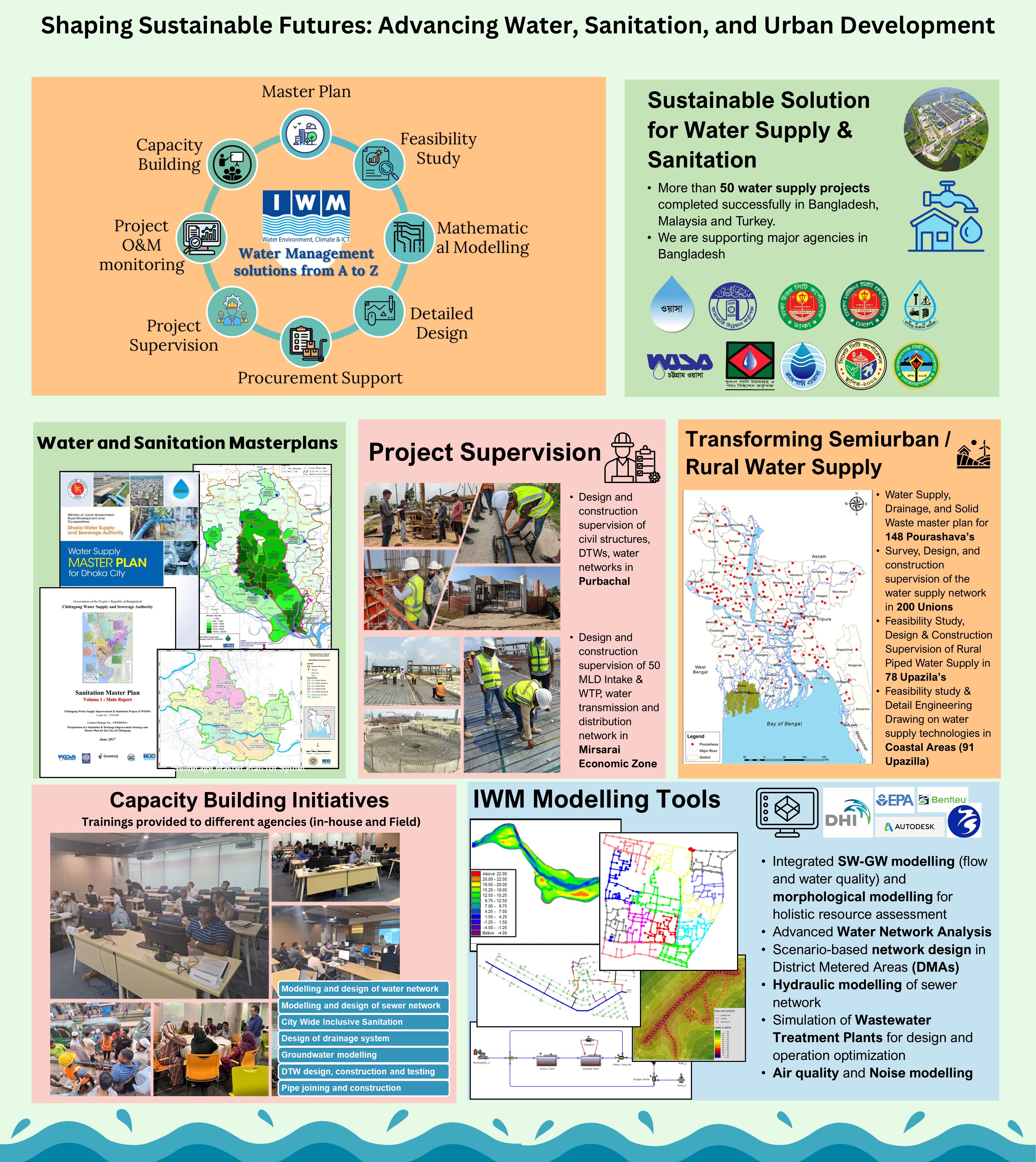
The Institute of Water Modelling (IWM) has been playing a pioneering role in promoting Integrated Water Resources Management (IWRM) in Bangladesh through advanced research, modelling, and decision-support systems. The Water Supply, Sanitation and Urban Water Management (WSU) Division promotes IWRM by practicing coordinated and sustainable management of all components of the urban water cycle including water supply, wastewater, stormwater, surface water, and groundwater. Instead of viewing these as separate systems, we focus on treating them as interlinked parts of a single resource system that must be managed collectively to ensure water security, environmental health, and social equity.
For urban water supply, WSU emphasizes diversifying water sources such as surface water, groundwater, rainwater harvesting, and reclaimed wastewater to reduce dependency on a single source and enhance resilience to climate variability. WSU also promotes demand management, water-use efficiency, and leakage control to make better use of available supplies. We use all these IWRM principles in our projects such as Water Supply and Sewerage Master Plans (2013 and 2014) and their ongoing updating through our technical support, Different Municipal Piped Water Supplies System, Feasibility studies for water supply and stormwater management in Dhaka and other major cities, Trust Green City Water Management Projects etc. to name a few.
In parallel, we consider integrating land use planning and watershed management as the foundation to protect water sources from pollution and provide environmental modelling services. IWRM also stresses the participation of multiple stakeholders including municipal authorities, water utilities, industries, communities, and policymakers to ensure decisions are equitable and based on shared understanding of trade-offs. We ensure relevant stakeholders’ participation, uses GIS and modelling tools, and decision-support systems to implement IWRM principles effectively across Bangladesh.
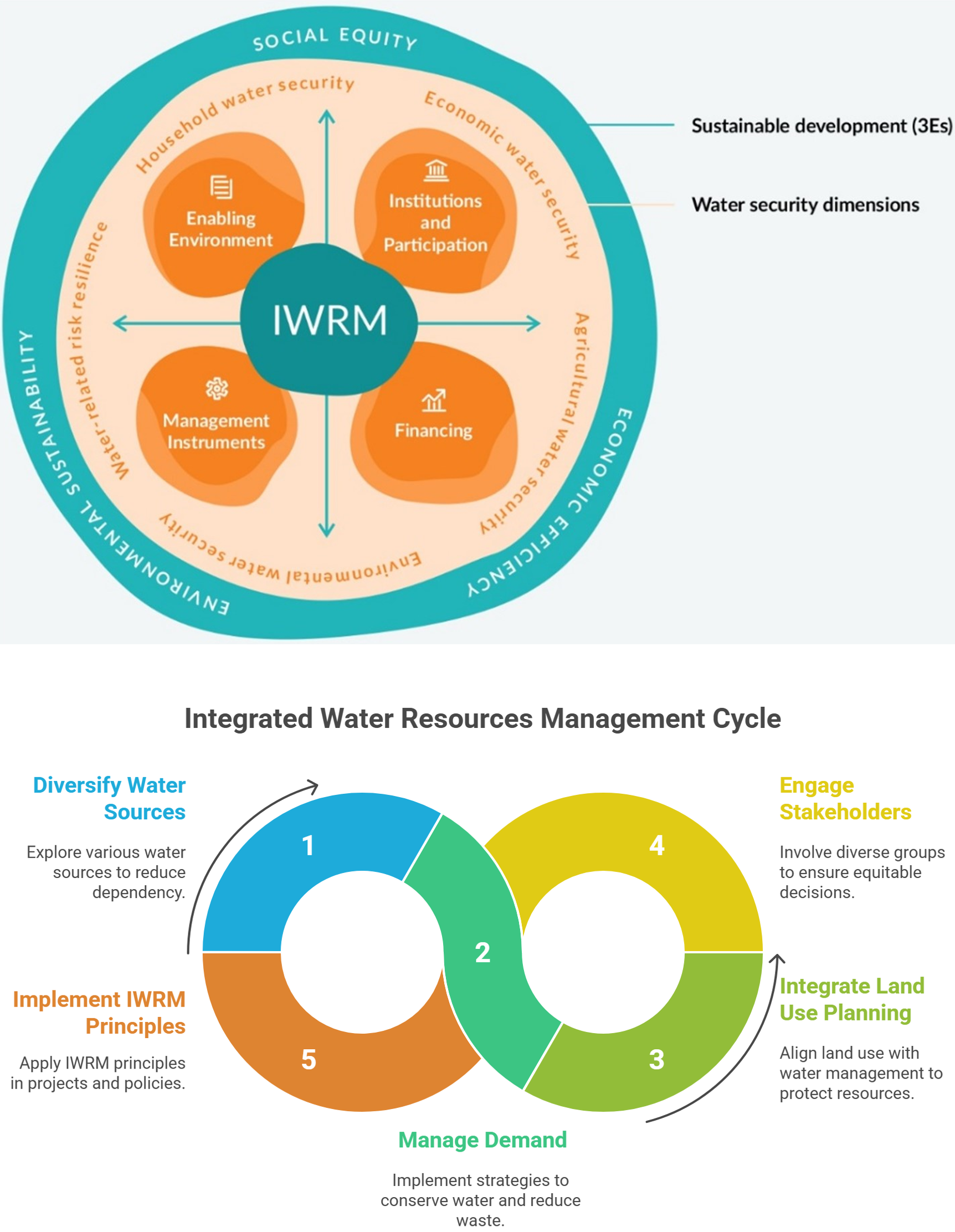
We provide advanced and reliable solutions for water treatment and supply systems serving both urban and rural communities. Our expertise spans the entire project cycle, from master planning and feasibility studies to hydraulic modelling, detailed engineering design, tender documentation, and construction supervision. Each project is delivered with a strong emphasis on sustainability, operational efficiency, and long-term performance.
Our expertise covers the comprehensive planning, design, and construction supervision of complete water treatment systems. Beginning with source assessment and identification, we analyze hydrological, morphological, hydraulic, and environmental parameters to determine the most suitable intake location and design, including intake pumping stations and associated bank protection measures. The treatment process involves conventional methods such as clarification, filtration, purification, and disinfection, as well as advanced technology like Reverse Osmosis (RO) for saline or highly purified water requirements. We employ modern, energy efficient, and cost-effective techniques to ensure delivery of safe drinking water. These facilities are seamlessly integrated with treated water reservoirs, treated water pumping station, transmission mains, and booster pumping stations to provide continuous and efficient water supply to end users.
We plan and design water transmission and distribution networks to improve efficiency, reduce water losses, and ensure reliable service. Using advanced hydraulic modeling, we perform steady-state and extended-period simulations along with surge, criticality, flushing, and sensitivity analyses. For transmission lines, we address challenges such as long-distance flow, terrain variation, and pressure management. In distribution systems, urban areas benefit from District Metered Areas (DMA) that provide 24×7 reliable water supply, ensuring efficient distribution and optimized network performance. In rural and peri-urban areas, our focus is on equitable water delivery, maintaining adequate pressures at all points of use. By combining modern hydraulic design, advanced simulations, and careful planning, we deliver sustainable, high-quality water supply solutions tailored to every community.
Our approach also emphasizes climate resilience, water quality, and sound engineering practice. We apply practical, technology driven methods to develop systems that are robust, adaptable, and easy to operate and maintain.
Over the years, we have successfully completed major assignments for leading national agencies including DWASA, CWASA, RWASA, KWASA, DPHE, SCC, RAJUK etc. Through these collaborations, we have contributed to the development of sustainable and dependable water infrastructures that support community growth and well-being.
We remain committed to delivering technically sound, cost-effective, and future-ready water treatment and supply systems that ensure safe and sustainable water for all
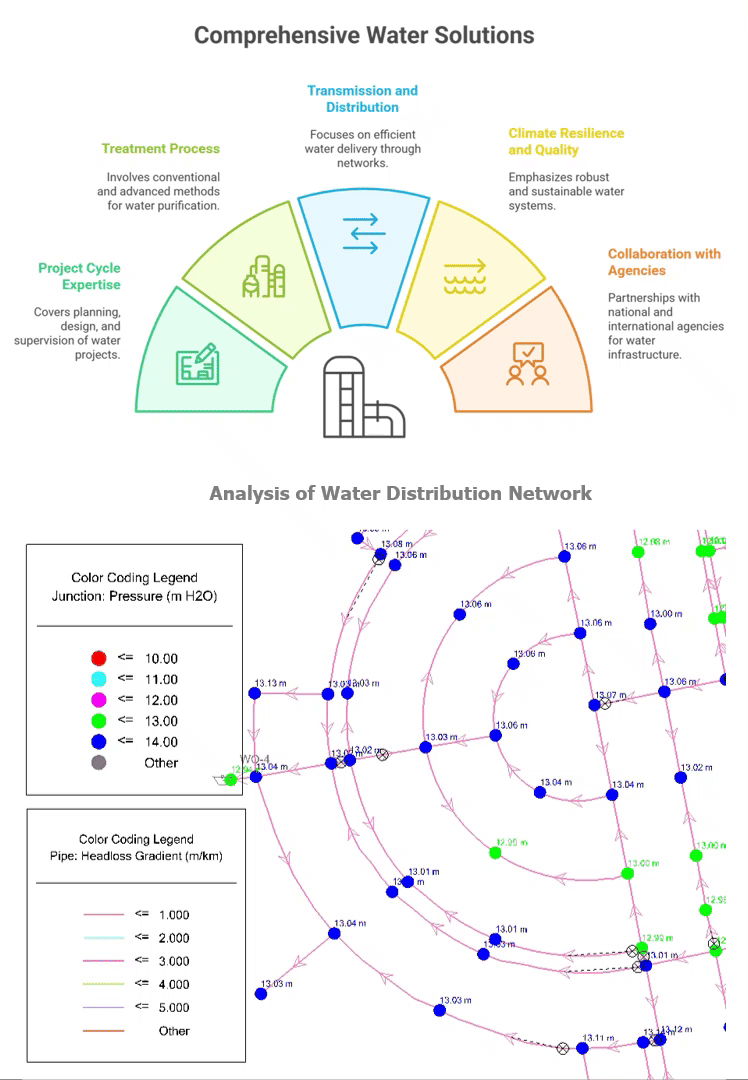
IWM stands as a pivotal force in advancing Bangladesh's sanitation and sewerage infrastructure by providing end-to-end consultancy services, from master planning and feasibility studies to detailed design and construction supervision, ensuring sustainable and resilient sanitation solutions. Our sanitation services cover major metropolitan areas such as Dhaka, Chattogram, Khulna, Rajshahi, and Sylhet; urban and semi-urban municipalities; as well as low-income communities across Bangladesh. Our proven expertise in the sanitation sector encompasses:
Our expert support has been instrumental in shaping the sewerage landscape of major cities, serving as a trusted partner for the major sanitation service authorities—including DWASA, CWASA, KWASA, and SCC. Additionally, we are supporting international agencies like the World Bank, ADB, UNICEF etc. in the identification and design of priority sanitation projects in metropolitan cities of Bangladesh. Beyond traditional centralized systems, we are at the forefront of integrating sustainable approaches. Under projects like the World Bank-funded Metro Dhaka Resilience Project, IWM is pioneering Fecal Sludge Management (FSM) and implementing the Citywide Inclusive Sanitation (CWIS) framework for city corporations, including DNCC, DSCC, Gazipur, and Narayanganj. This demonstrates IWM's commitment to holistic and inclusive sanitation management. We also actively organize training and capacity-building programs on sanitation and sewerage systems, including internships for hands-on experience, academic lectures at prestigious universities, different workshops, and seminars.
With a robust portfolio of successful projects and a forward-thinking approach, IWM demonstrates unparalleled competence in advancing Bangladesh's sanitation sector toward sustainable and climate-resilient sanitation management.

IWM stands as the national centre of excellence in stormwater management and urban drainage modelling in Bangladesh. With decades of specialised experience in hydrology and hydraulics, IWM possesses exceptional expertise in analysing, simulating, and designing urban stormwater systems to address flooding, drainage congestion, and climate-induced water challenges. Through advanced scientific modelling and data-driven decision-support systems, the Institute provides innovative, sustainable, and resilient stormwater management solutions for rapidly urbanising and flood-prone areas across the country.
The Water Supply, Sanitation and Urban Water Management Division of IWM serves as the dedicated technical wing for developing and implementing such initiatives. The Division’s core strength lies in integrated stormwater management, where hydrologic–hydraulic modelling, hydrodynamic modelling, GIS-based spatial analysis, and engineering design are combined to develop efficient, adaptive, and sustainable drainage networks. The WSU Division works in close collaboration with government agencies and city corporations, i.e., DSCC, DNCC, DWASA, SCC, CWASA, CCC, KWASA, GCC, DPHE, etc., and development partners to formulate drainage master plans, conduct flood risk assessments, and design climate-resilient infrastructure for sustainable urban development. The WSU Division has successfully completed numerous landmark stormwater management projects, demonstrating IWM’s leadership in the sector. The geographical work experiences of this division span major cities, i.e., Dhaka, Chattogram, Sylhet, Khulna, Barisal, Narayanganj, Gazipur, and a number of municipalities of Bangladesh, funded by the Government of Bangladesh, World Bank, ADB, European Union, etc.
The WSU Division provides a comprehensive range of technical services covering all aspects of stormwater management, including:
IWM continuously adopts and integrates state-of-the-art technologies, innovations that enable precise prediction of hydrologic behaviour, enhance the reliability of model outcomes, and support evidence-based infrastructure design. By incorporating Integrated Urban Water Management approaches and Nature-Based Solutions (NbS) into its methodologies, IWM ensures that its stormwater management initiatives contribute to sustainable, climate-resilient, and livable urban environments.
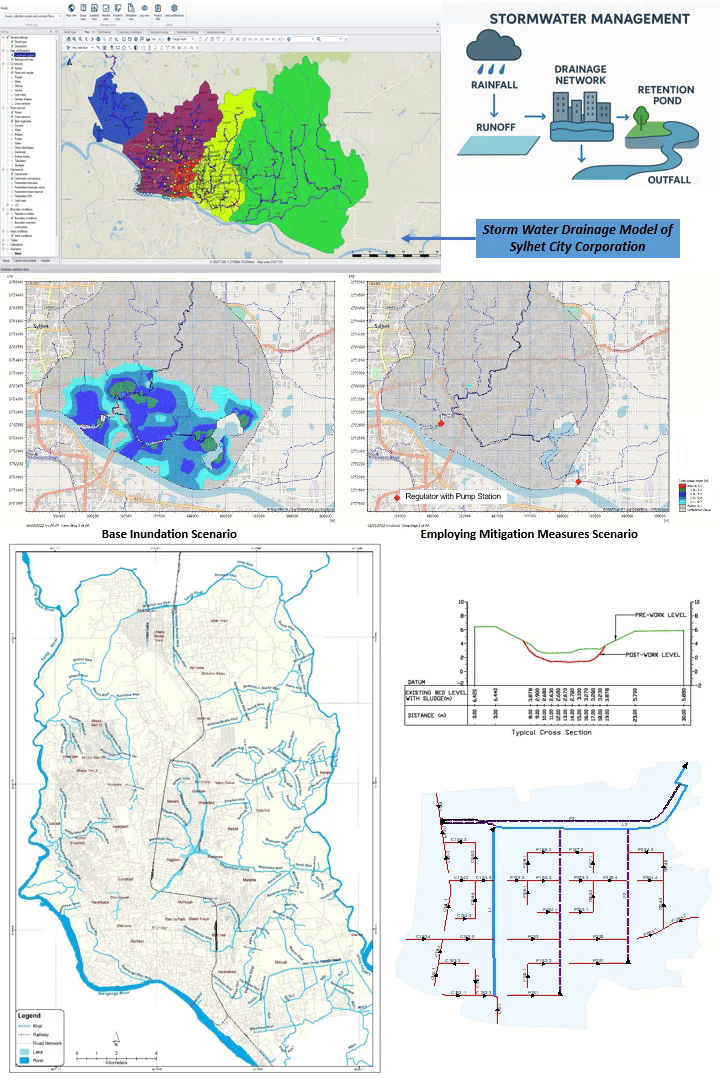
The Institute of Water Modelling (IWM) has extensive expertise in preparing and implementing comprehensive master plans that address the country’s critical infrastructure and development needs in water supply, sanitation and urban water sector.
🌊 Water Supply, Sewerage, and Drainage Master Plans
IWM has successfully developed water supply, sewerage, and drainage master plans for cities and sub-urbs across Bangladesh, including megacities Dhaka and Chattogram, ensuring sustainable access to clean water, effective wastewater management, and resilience against urban flooding.
🛣️ Road and Drainage Master Plans
To address urban mobility and stormwater challenges, IWM has also prepared road and drainage master plans for Dhaka North and Dhaka South City Corporations. These plans integrate transport infrastructure with modern drainage solutions, reducing congestion and waterlogging while supporting safer, more efficient urban living.
🏗️ Master Plans for Economic Zones and Education Hubs
Beyond urban utilities, IWM has contributed to the planning of economic zones and education hubs, providing blueprints for industrial expansion, investment attraction, and the creation of modern learning environments. These projects are designed with reliable water, sanitation, and drainage systems to ensure long‑term sustainability.
🌍 Contribution to National Development
Through these landmark Master plans, IWM has become a trusted partner for government agencies, development partners, and private stakeholders. Our master plans not only address immediate infrastructure needs but also align with Bangladesh’s broader goals of economic growth, urban resilience, and sustainable development.
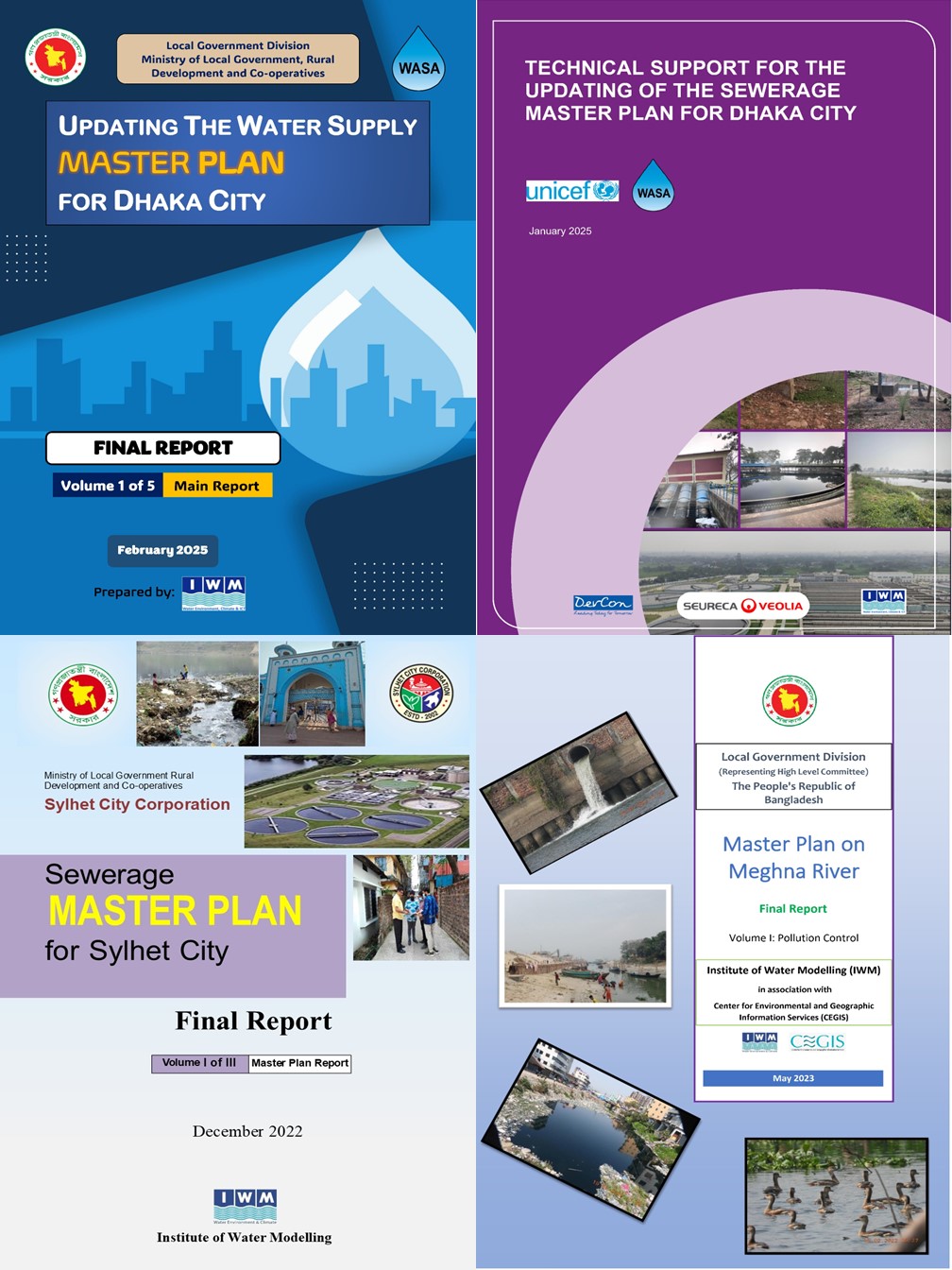
The WSU (Water Supply, Sanitation and Urban Management) division of the Institute of Water Modelling (IWM) has extensive experience and expertise in water quality management, including data collection and analysis of various physical, chemical, and biological parameters from domestic, industrial, and agricultural sources.
The division's services encompass:
IWM's capabilities are enhanced by its use of advanced mathematical modeling tools like MIKE and EcoLab. The organization first developed a water quality model for Dhaka city in 2004. This model assessed the impact on rivers such as the Balu, Sitalakhya, Turag, Buriganga, and Tongi Khal. Since then, IWM has been involved in numerous projects to evaluate both current and future water quality, taking into account climate and socio-economic changes.
A significant project undertaken by IWM is the Master Plan on Meghna River Pollution Control, which was approved on December 30, 2024. This plan identifies crucial actions to improve the river's water quality, making it a suitable source for Dhaka's water supply and helping to maintain the local ecosystem.
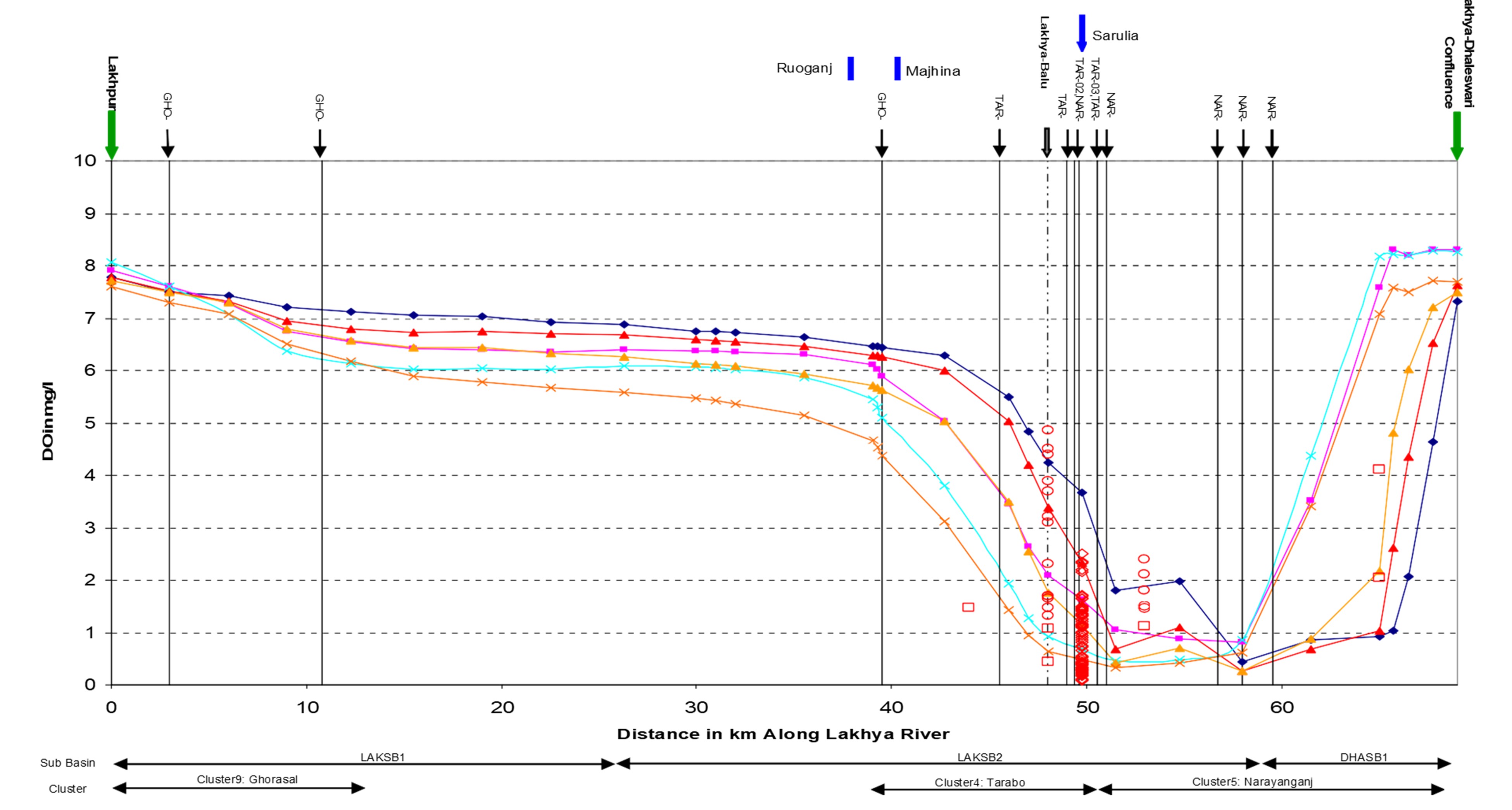
We provide technical assistance in conducting Environmental and Social Impact Assessment (ESIA), Environmental and Social Management Framework (ESMF), Initial Environmental Examination (IEE), studies for water, sanitation, and urban water management projects in Bangladesh, following the guidelines of the DoE, and multilateral development banks like the World Bank, ADB etc. These studies aim to ensure that development interventions are environmentally sustainable, socially inclusive, and compliant with national regulations and international safeguard standards. We integrate field investigations, hydrological and hydraulic modeling, water quality analysis/modelling, environmental modelling, and socio-economic assessments to identify potential environmental risks and social implications of proposed projects. Typical focus areas include impacts on surface and groundwater resources, aquatic ecosystems, land use, resettlement, and community health and safety.
In numerous projects, such as those supporting Dhaka, Khulna, Rajshahi, and Chattogram WASA’s as well as several municipalities, our ESIA studies have guided the design of environmentally sound and socially acceptable solutions, including measures for pollution control, habitat conservation, and livelihood restoration. By combining technical expertise with participatory consultations, we ensure that water infrastructure development contributes to sustainable urban growth while protecting the natural environment and enhancing community well-being.

Groundwater is the unseen lifeline supporting communities, agriculture, and ecosystems. Our services on groundwater resource management bring together advanced science and extensive field experience to provide reliable assessment, monitoring, and sustainable management solutions. By integrating data collection, modeling, and decision-support tools, we help organizations plan and maintain secure, high-quality water supplies for generations to come.
Our core services on Groundwater Resource Management include:
Through exploration drilling, geophysical surveys—including Vertical Electrical Sounding (VES) and detailed borehole logging, we investigate subsurface formations to generate comprehensive data for aquifer mapping, hydro-stratigraphic models, water-bearing zone identification, and groundwater resource assessment.
Leveraging advanced hydrological modeling platforms such as MIKE SHE, MODFLOW, and other cutting-edge simulation tools, we deliver robust and data-driven groundwater modeling services. Our capabilities encompass comprehensive assessments of groundwater resource availability, recharge dynamics, and aquifer behavior under varying stress conditions, including climate change projections to forecast future groundwater trends.
We assist national and international agencies in establishing and operating groundwater monitoring networks (ranging from conventional instruments to IoT-based sensors, equipped with telemetry and cloud-based databases ) that track seasonal and long-term variations in water level and quality.
Our services include detailed water quality analyses and interpretations, covering major ion chemistry, trace elements, and isotope composition to evaluate suitability for drinking, irrigation, and industrial use.
We provide service for the design and implementation of Managed Aquifer Recharge (MAR) systems suited to local hydrogeological conditions, along with continuous monitoring of recharge performance and its environmental impact.
Our team provides on-site supervision of the construction of monitoring wells and production tubewells (PTWs), along with borehole development and pumping tests, ensuring full compliance with design standards and environmental safety requirements.
We combine field data, analytical tools, and scientific modeling to create actionable insights for sustainable groundwater management. Our work supports policymakers, engineers, and planners in making informed decisions that balance development needs with environmental protection.
Through innovation, precision, and collaboration, we strive to secure the future of groundwater, the world’s most essential yet most fragile freshwater resource.

Project implementation involves directly managing a project to ensure it meets the objectives outlined in the planning phase. IWM is providing project implementation support to its clients. Project implementation support involves activities like contract management as the representative of the employer/client, design optimization, construction supervision, timely completion of projects and ensure other aspects of project management to achieve the optimum techno-economic benefit of the projects to the clients.
IWM has provided project implementation support in the field of water supply, sewerage, urban drainage, and other urban water related projects to DWASA, CWASA, RWASA, KWASA, BEZA, DPHE, City Corporations. Different project management tools have been used along with the modelling, design, and decision support tools, in which IWM has gained vast accolades. IWM’s active roles as the Employer’s representative (as the Consultant/ the Engineer) in the implementation of the following projects are worth mentioning:
Construction of 50 MLD WTP in BSMSN, Mirsarai, Chattogram project has four components (i) 105 MLD Intake at the Muhuri Reservoir, (ii) 10 Km Raw Water Transmission Main, (iii) 50 MLD WTP along with ancillary structures, and (iv) around 40 Km Treated water transmission and distribution network for the priority zones of BSMSN. This project is being implemented by BEZA following the FIDIC Contract management process, and IWM is working as “the Engineer” in this project. See the picture showing the future impression of the project area.
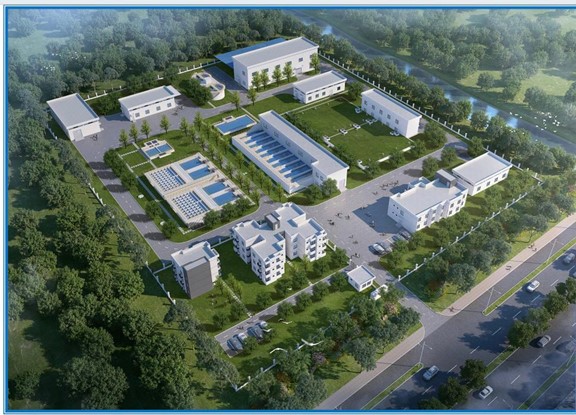
Cross-cutting issues are overarching thematic considerations that influence all components of a project and must be systematically integrated into planning, implementation, and monitoring to ensure sustainability, inclusiveness, and effectiveness. In water supply and sanitation projects, cross-cutting issues play a critical role in ensuring sustainability, equity, and long-term effectiveness of investments. Gender equality and social inclusion are key considerations, as women, children, the elderly, and marginalized groups are often the most affected by inadequate water and sanitation services.
In different projects, WSU tries to ensure inclusive participation in decision-making processes and equitable access to services. Climate change adaptation and disaster risk reduction are also essential cross-cutting issues, requiring water supply systems to be designed to withstand floods, droughts, salinity intrusion, and other climate-induced hazards. Environmental sustainability must be integrated through source protection, efficient water use, safe sludge and wastewater management, and prevention of environmental pollution. Public health and hygiene promotion are closely linked to sanitation improvements, emphasizing behavior change, hygiene awareness, and safe water handling practices to reduce waterborne diseases. Institutional capacity building and good governance are equally important, focusing on strengthening service providers, improving operation and maintenance, enhancing financial sustainability, and ensuring regulatory compliance. Stakeholder engagement and community participation throughout the project lifecycle help build ownership and accountability.
Addressing these cross-cutting issues in an integrated manner in our different projects, we focus on ensuring that water supply and sanitation projects deliver resilient, inclusive, and health-positive outcomes while contributing to broader social, environmental, and development goals.
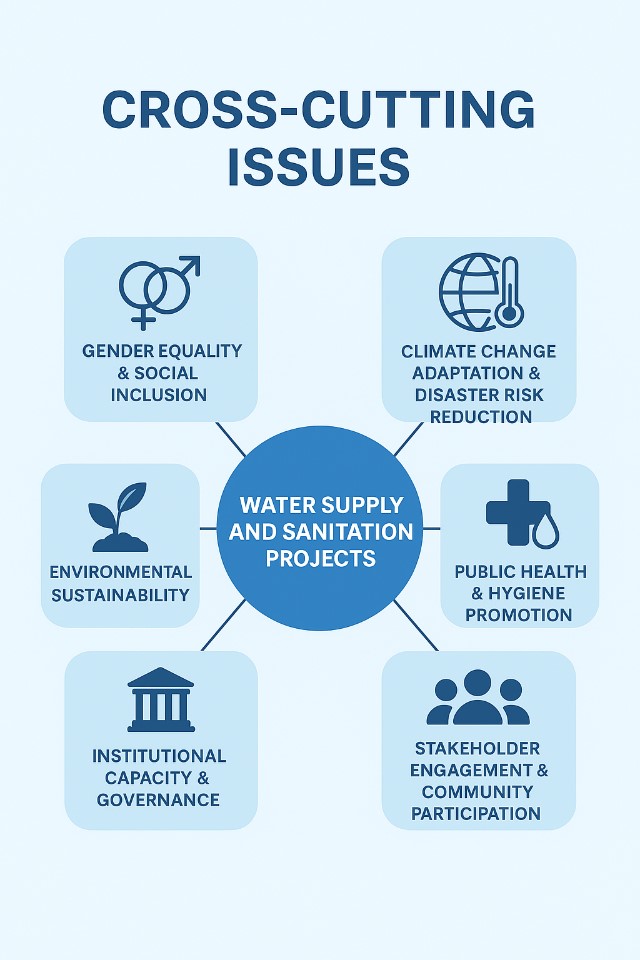
Our Milestone Projects
In 2014, with support from the IWM, Dhaka WASA (Dhaka Water Supply and Sewerage Authority) developed the first Water Supply Master Plan to meet the city’s growing water demands and achieve the Sustainable Development Goals (SDGs). Following that rapid urbanization, population growth, climate change, and new infrastructure plans made it necessary to update the master plan. IWM supported DWASA in developing the updated Water Supply Master Plan of 2025, aligning with national policies, global frameworks, and Bangladesh’s vision for future development. The main goal of the updated Master Plan was to reduce Dhaka's dependence on groundwater, aiming for at least 70% of the water supply to come from surface sources over the next decade, as well as promoting sustainability in the water supply sector by incorporating demand management, wastewater reuse, and smart water city approaches.
The master plan outlines several key strategies to meet the rising demand for water across residential, industrial, and commercial sectors and improve service delivery:
Smart Water City Transformation: The plan envisions Dhaka becoming a Smart Water City by prioritizing wastewater reuse, water conservation through the use of modern fittings and faucets, demand management through implementing IBT, and using advanced technology like real-time monitoring, leak detection, and smart meters to improve water management and reduce NRW.
Utilize Surface Water and Promote Reuse/Recycling of Treated Wastewater: The plan outlines a pathway for meeting up to at least 70% of water demand using surface water sources of major rivers like the Padma and Meghna. It encourages the reuse and recycling of treated wastewater for non-drinking purposes such as car washing, landscape, gardening, and industrial use, reducing pressure on potable water sources.
Monitoring Water Quality: Continuous monitoring of water quality ensures safe drinking water by regularly testing the water supply throughout the distribution network.
Equitable Access: The plan aims for equitable access to water, expanding services to underserved areas, and ensuring all citizens, regardless of income, have access to clean water. It also emphasizes public welfare by expanding the service for water ATM’s and water fountains in public places.
Climate Resilience and Disaster Preparedness: The Master Plan includes climate resilience measures, ensuring infrastructure can withstand extreme weather events and managing water resources during droughts and floods.
In summary, the Updated Water Supply Master Plan 2025 aims to ensure a sustainable, reliable, and climate-resilient water supply for Dhaka, meeting both current and future demands while promoting equity and smart water management.

Sewerage Master Plan for Dhaka City 2025 updates and revises the 2013 Dhaka Sewerage Master Plan to reflect major changes over the past decade in population growth, urban development, infrastructure, institutions, environmental conditions, and climate risks. It defines the planning area and provides a phased, data-driven framework for developing sewerage and sanitation services up to 2050, with a strong focus on safety, inclusiveness, sustainability, and climate resilience.
The diagnostic assessment identifies critical weaknesses in the current sanitation system, including very limited sewer coverage, aging and malfunctioning networks, unsafe fecal sludge disposal, severe river pollution, and significant public health risks, particularly for low-income and informal settlements. Despite recent investments such as the commissioning of the Dasherkandi STP, sanitation service coverage remains limited, and large volumes of wastewater and fecal sludge continue to bypass formal treatment systems, contributing to ongoing pollution of drains and rivers.
The updated strategy adopts a Citywide Inclusive Sanitation approach (CWIS), integrating sewerage expansion with improved fecal sludge management. Population within the SMP area is projected to increase from about 12 million in 2025 to approximately 23.6 million by 2050. Ten sewerage catchments are defined, with phased expansion of networks and treatment capacity. By 2050, most planned areas are expected to be sewered, while FSM will continue to serve unplanned and hard-to-reach areas.
The plan sets out catchment-specific conveyance and treatment strategies, supported by least-cost analysis, and identifies opportunities for inter-catchment transfers where land constraints exist. Advanced, energy-efficient wastewater and sludge treatment technologies are recommended to meet stricter effluent standards, reduce greenhouse gas emissions, and enable energy recovery. Climate risk assessments inform targeted adaptation measures to improve the resilience of networks, pumping stations, treatment plants, and operations.
Overall, the updated SMP provides a practical, phased roadmap to achieve equitable, climate-resilient, and sustainable sanitation services for Dhaka by 2050, while reducing pollution, protecting public health, and strengthening institutional capacity.
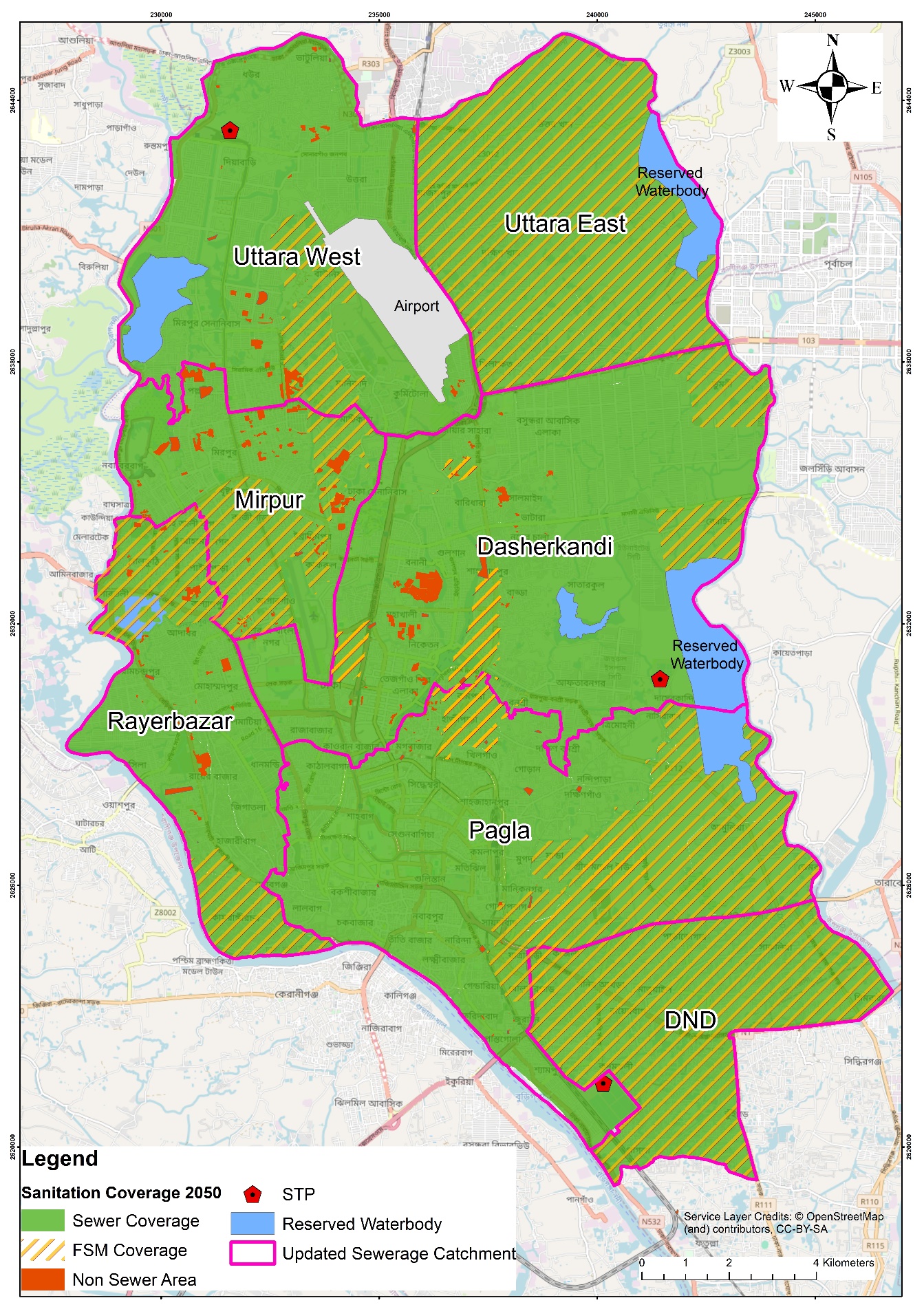
The Institute of Water Modelling (IWM) had prepared the Sewerage Master Plan for Sylhet City to address the city’s critical sanitation and wastewater management challenges. While Sylhet had made progress in water supply, the absence of a formal sewerage system meant that untreated sewage was discharged directly into rivers and water bodies, posing severe environmental risks. The master plan, with a planning horizon up to 2050, had been designed to achieve long‑term national goals for safe sanitation. Covering an area of 105.33 sq. km, including the entire Sylhet City Corporation and seven adjoining unions, the plan had projected population growth from 630,467 in 2011 to over 2.58 million by 2050. A sanitation strategy had been formulated in line with national policies, incorporating local conditions such as geography, socio‑economic context, and land availability for infrastructure development.
In developing the master plan, IWM had adopted a decentralized approach by dividing the area into five catchments. Sewerage infrastructures, including three sewage treatment plants, about 400 km of sewer network, and 10 sewage lift stations, had been proposed for catchments C‑1, C‑2, and C‑3, with a target of 70% connectivity by 2050. For catchments C‑4 and C‑5, on‑site sanitation or simplified systems had been recommended. Implementation had been planned in three phases: parts of SCC with adequate water supply were to be connected by 2025, the remaining SCC areas by 2030, and extended catchments by 2040 and 2050 depending on water supply and road network development. As an interim measure, improved on‑site sanitation facilities such as septic tanks, communal systems, and sludge management had been emphasized to bridge the gap until full sewerage coverage was achieved.
The financial analysis had estimated capital investments of about BDT 13,050 million for Phase‑1, BDT 11,200 million for Phase‑2, and BDT 5,800 million for Phase‑3. Economic assessments had demonstrated significant benefits, though financial feasibility required government support. It had been anticipated that Phase‑1 would be funded by the Government of Bangladesh as a grant, while SCC would mobilize resources for later phases through sewer tariffs or public‑private partnerships. Institutional analysis had highlighted the need for strengthening SCC’s manpower, logistics, and regulatory framework to manage sewerage systems effectively. The master plan had been recognized as a foundational step toward making Sylhet a model city, ensuring environmental safeguards, improving public health, and contributing to the national goal of safe sanitation for all.
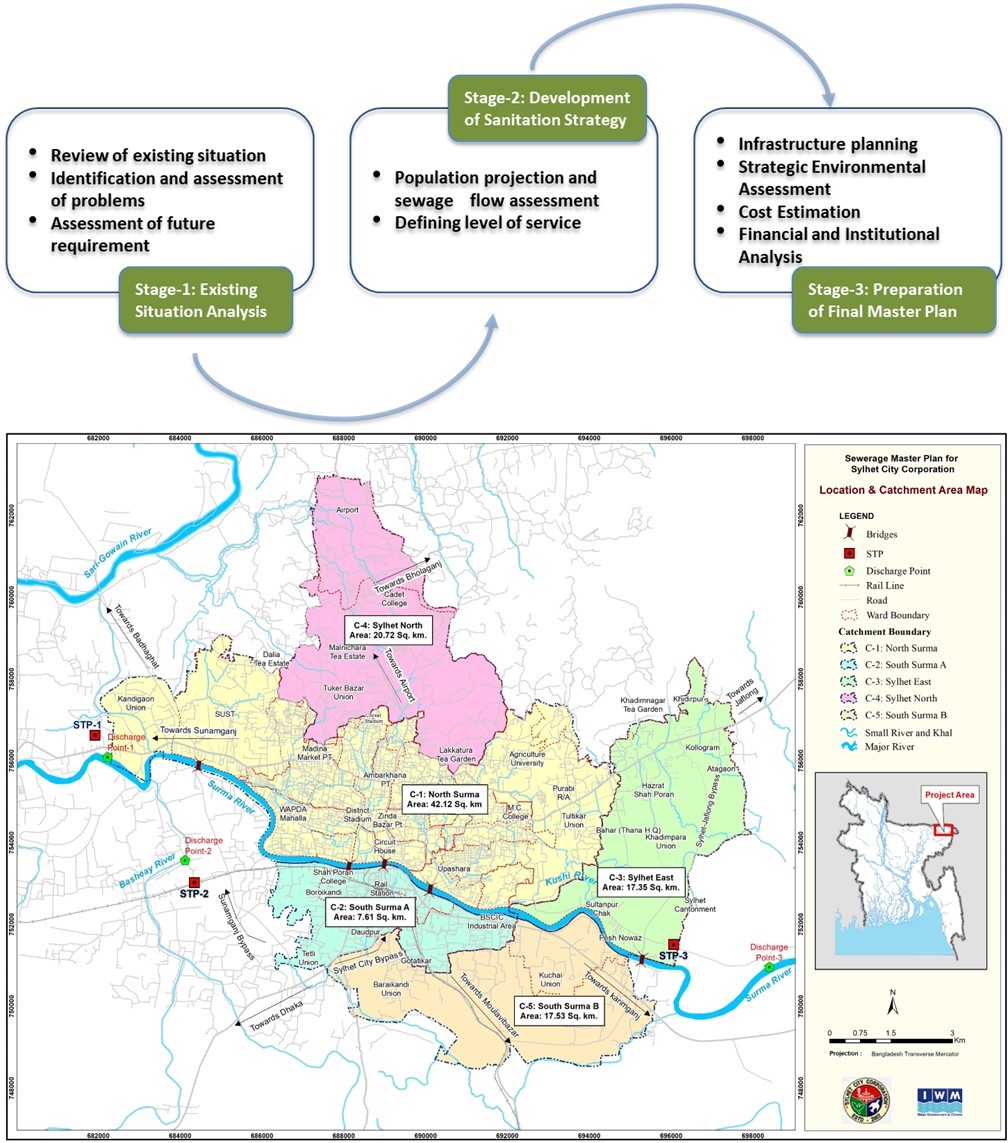
The Meghna River, one of Bangladesh's major rivers, is facing a growing threat of pollution from industrial and municipal waste. This is a result of rapid economic development and urbanization along the upper Meghna's banks, which is leading to untreated effluent and domestic waste being discharged directly into the river.
To address this issue, the Institute of Water Modelling (IWM) developed the Master Plan on Upper Meghna River, which has been approved. The plan is based on a year-round water quality monitoring study of 22 parameters from 21 locations along the river. IWM also conducted surveys to identify and gather information on approximately 1,200 water-polluting industries in the area.
The master plan outlines 38 action plans (14 structural and 24 non-structural) to combat water pollution in the Meghna and its tributaries. These plans are categorized by priority level—very high, high, and medium—with a recommendation for immediate implementation of the very high-priority projects. The plan also recommends that future industrial growth should continue only with adequate effluent treatment, and that municipal waste should be treated or recycled.
A water quality model was developed to project the river's pollution status up to 2041, both with and without the proposed interventions. The plan's implementation is estimated to cost BDT 39,117 million in the short term, BDT 232,213 million in the medium term, and BDT 139,865 million in the long term.
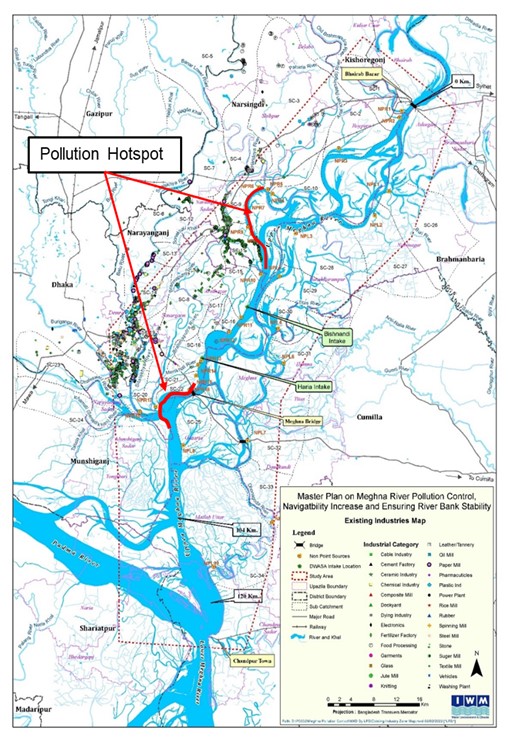
The Department of Public Health Engineering (DPHE) had initiated a nationwide project by engaging Institute of Water Modelling (IWM) titled “Groundwater Management and TPP for Survey, Investigation and Feasibility Study in Upazila and Growth Center level Pourashavas having no Piped Water Supply System”. The program was designed to support the government’s vision of ensuring safe, affordable water and sanitation services for all citizens. Covering 148 pourashavas (area about 1900 sq km) across Bangladesh, the project was highly relevant to national sector development policies and addressed diverse hydrological, hydro‑geological, and socio‑economic conditions. Its overall objective had been to prepare master plans for water supply, drainage, sanitation, and solid waste management, supported by detailed engineering designs, operation manuals, and long‑term phased implementation strategies.
The scope of the project had included identifying safe drinking water sources with special attention to arsenic contamination, conducting feasibility studies on groundwater and surface water to ensure perennial supply, and determining demand and service levels to guide infrastructure design. Each Pourashava had received a tailored master plan that integrated water supply systems, stormwater drainage improvements, sanitation and sewerage facilities, and solid waste management solutions. Economic and financial analyses had been conducted to ensure affordability and cost recovery, while environmental and social impact assessments had safeguarded sustainability and inclusivity. To achieve these goals, the project had been divided into two components: mathematical modelling for safe source identification, and detailed engineering surveys, investigations, and designs, complemented by socioeconomic and environmental studies.
Implementation had progressed in multiple phases, gradually covering all 148 pourashavas. Activities had included topographical and hydrogeological surveys, test borings, socio‑economic baseline studies, and preparation of physical and land use maps. Infrastructure planning had encompassed production tube wells, treatment plants, storage tanks, distribution pipelines, drainage networks, sanitation facilities, and waste management systems. Alongside technical interventions, the project had emphasized institutional strengthening through training and technology transfer to DPHE and Pourashava personnel, ensuring local capacity for long‑term operation and maintenance. With short, mid, and long‑term horizons extending to 2040, the initiative had represented a transformative step toward resilient urban infrastructure, improved public health, and sustainable municipal services across Bangladesh.
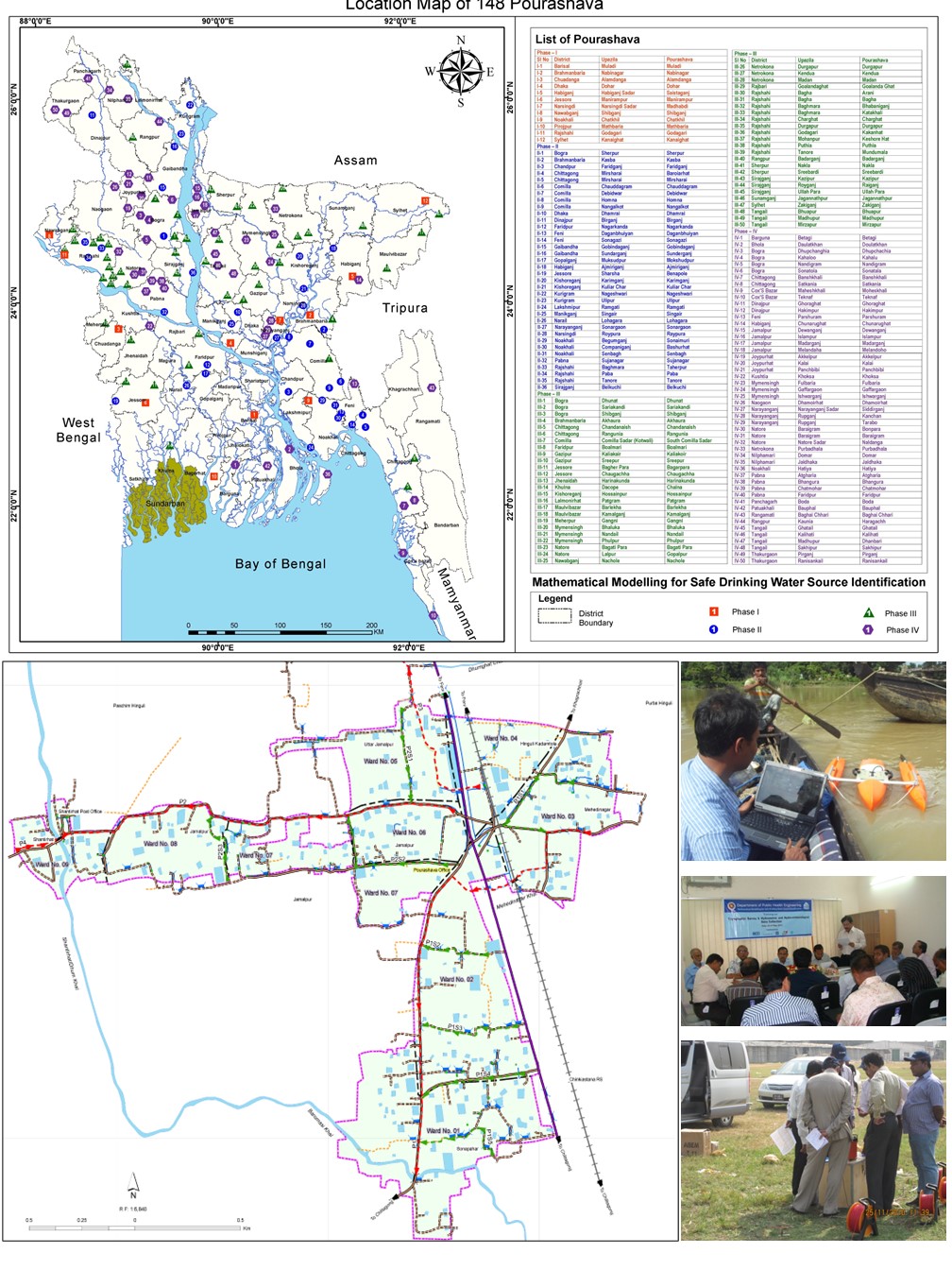
Dhaka Water Supply and Sewerage Authority (DWASA) is responsible for providing piped water to Dhaka Metropolitan City and its surrounding areas, where groundwater has historically been the dominant source. By 2006, 83 percent of the supply came from groundwater through more than 400 deep tubewells, while the remainder was drawn from treatment plants at Saidabad, Chadnighat, and Narayanganj. With the city’s population projected to rise from 12 million in 2010 to 22 million by 2025, demand has placed severe stress on the Upper Dupitila aquifer, which is depleting at an alarming rate of 2–3 meters per year. This unsustainable abstraction raises risks of land subsidence and environmental degradation, while pollution in peripheral rivers has further limited surface water options. To address these challenges, DWASA employed the Institute of Water Modelling (IWM) to carry out a comprehensive study between 2004 and 2006, aimed at developing a long-term water abstraction strategy supported by demand management and monitoring systems.
The study assessed both groundwater and surface water resources. The scope of services included hydrogeological investigations, geophysical and geochemical surveys, aquifer testing, isotope analyses to determine recharge potential, and groundwater modelling across 8,778 square kilometers of Greater Dhaka to evaluate groundwater levels, flow conditions, and risks of land subsidence under different abstraction scenarios. Surface water modelling was also conducted to assess the impact of withdrawals upstream and downstream of intake points. In the upper aquifer, total abstraction reached 700 Mm³ in 2004–2005, causing widespread drawdown and increasing numbers of defunct wells. While regeneration techniques could improve yields, further expansion was deemed unsustainable. Exploration of deeper aquifers around 300 meters revealed promising potential, with hydrostratigraphic studies confirming thick sand layers and favorable piezometric heads. Sustainable abstraction of up to 139 Mm³ annually was considered feasible, though continuous monitoring was recommended to prevent excessive declines. In Singair Upazila, investigations identified a deeper aquifer composed of coarse sand and gravel with high hydraulic conductivity. Model results suggested sustainable abstraction of 48 Mm³ per year, though arsenic contamination in shallow aquifers necessitated detailed feasibility studies to ensure safe development.
Surface water assessments focused on peripheral rivers, including the Dhaleswari–Kaliganga, Bangshi–Turag–Buriganga, and Balu–Lakhya systems. While sufficient flows were available to meet demand up to 2025, deteriorating water quality from untreated municipal and industrial discharges posed a major challenge. Alternative intake points, such as Majhina on the Lakhya River, were identified, but pollution control measures were deemed essential for sustainability. Larger rivers such as the Padma and Meghna were also investigated, offering dependable flows and acceptable water quality aside from high sediment loads during the monsoon. Harnessing these sources would require significant investment, with economic viability being the critical factor.
The study carried out by IWM concluded that five potential sources exist: the upper aquifer, deeper aquifers within Dhaka, deeper aquifers in Singair, peripheral rivers, and major rivers. Of these, further exploitation of the upper aquifer is unsustainable, while deeper aquifers and larger rivers present viable long-term options. Peripheral rivers could meet short to mid-term demand if pollution is controlled. Beyond resource assessment, the project emphasized demand management to optimize scarce water resources, incorporating population growth projections, land-use changes, and lifestyle factors. A comprehensive abstraction strategy and demand management plan were developed, alongside pre-feasibility studies on alternative supply options, cost estimates for future infrastructure, and monitoring systems based on field measurements and model outputs. Capacity building and training programs were conducted for DWASA staff and stakeholders, supported by workshops and seminars to strengthen institutional capacity.
Through this study, DWASA gained a strategic framework for immediate, mid-term, and long-term water supply planning. The findings provide evidence-based guidance for sustainable groundwater and surface water management, ensuring resilience of Dhaka’s water supply system and safeguarding public health and environmental sustainability for its rapidly growing population.
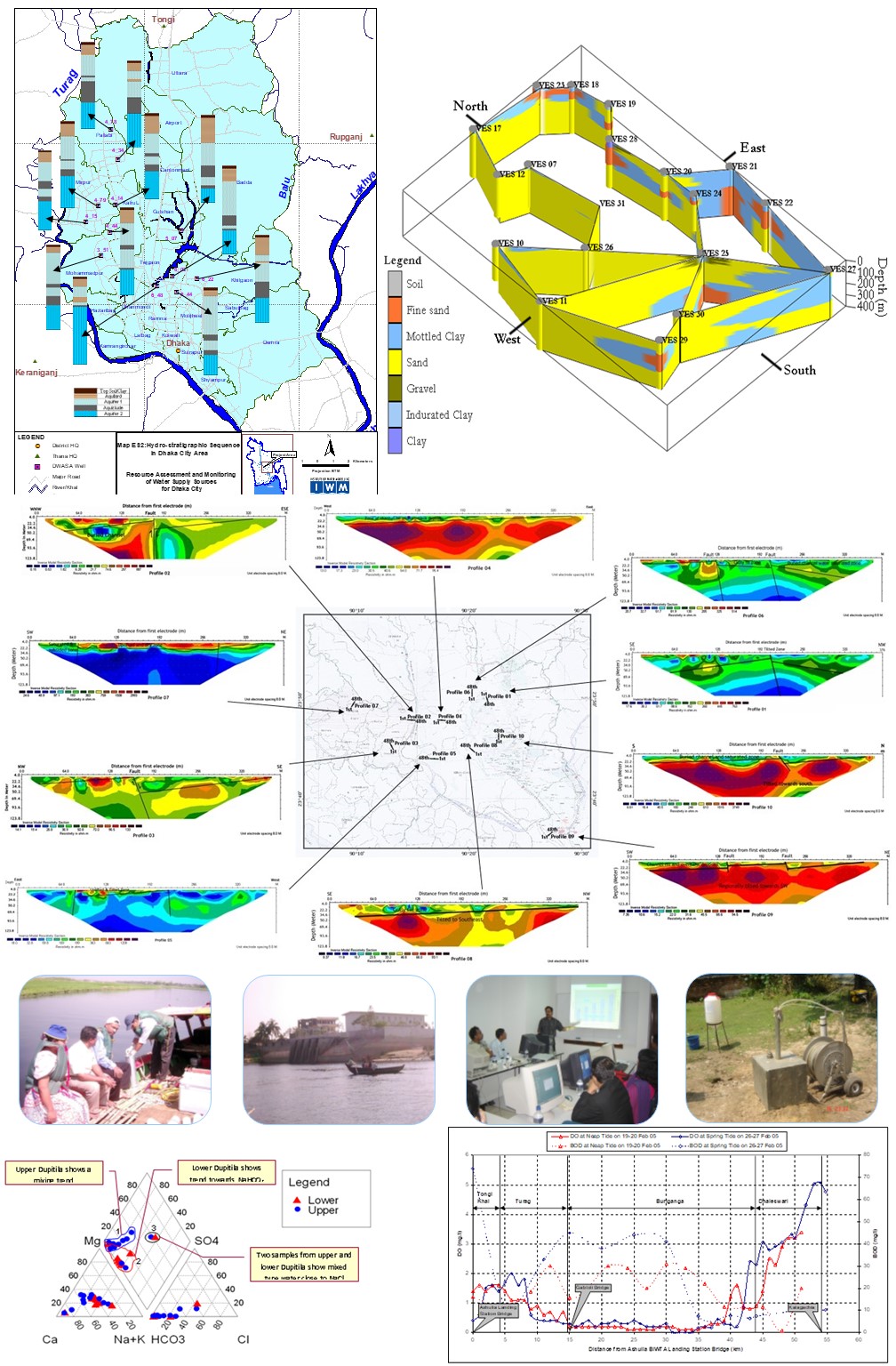
The Water Resources Planning Organization (WARPO) had engaged the Institute of Water Modelling (IWM) to undertake the Assessment of the State of Water Resources in Bangladesh. The study had aimed to assess both surface and groundwater resources in terms of quantity and quality, update the National Water Resources Database (NWRD) with new data and outputs, and provide technical support to international consultants updating WARPO’s models. The assessment had been based on extensive primary and secondary data analyses, including hydrologic, climatic, and socio‑economic information, which were compiled into an integrated database. Long‑term simulation results from mathematical models had also been incorporated, and statistical analyses had been conducted to evaluate the condition of water resources at multiple spatial scales i.e., Upazila, District, National, Catchment, and Basin.
The study had produced a wide range of outputs. A summary report had outlined the overall reporting structure, hydrological settings, water quality, and limitations. National‑level findings had described the country’s geographical, climatic, socio‑economic, and ecological context, with special focus on climate variability and water demands. District‑level reports had provided Upazila‑based assessments, covering 474 out of 491 Upazilas. Technical studies had addressed flood hydrology and climate change, border river flows, basin modelling, catchment delineation, irrigation water use, domestic and industrial demand, agricultural water demand, groundwater trends, deeper aquifer recharge, sediment transport, salinity, low and flood flows, and river‑aquifer interactions. These analyses had provided critical insights into water availability, quality, and long‑term sustainability under both current and future scenarios.
In total, the project had produced 89 reports, including separate assessments for 64 districts. Supplementary studies had covered training and technology transfer for WARPO staff, updated groundwater databases, rainfall data preparation, and evapotranspiration assessments. An Active Water Management Area study had also been completed for Khulna and Naogaon, combining technical, socio‑economic, and institutional perspectives. By integrating scientific analyses, modelling, and capacity building, the assessment had provided a comprehensive picture of Bangladesh’s water resources. It had laid the groundwork for improved planning, management, and policy development, ensuring that future strategies could address challenges of climate variability, resource sustainability, and growing demands across the country.
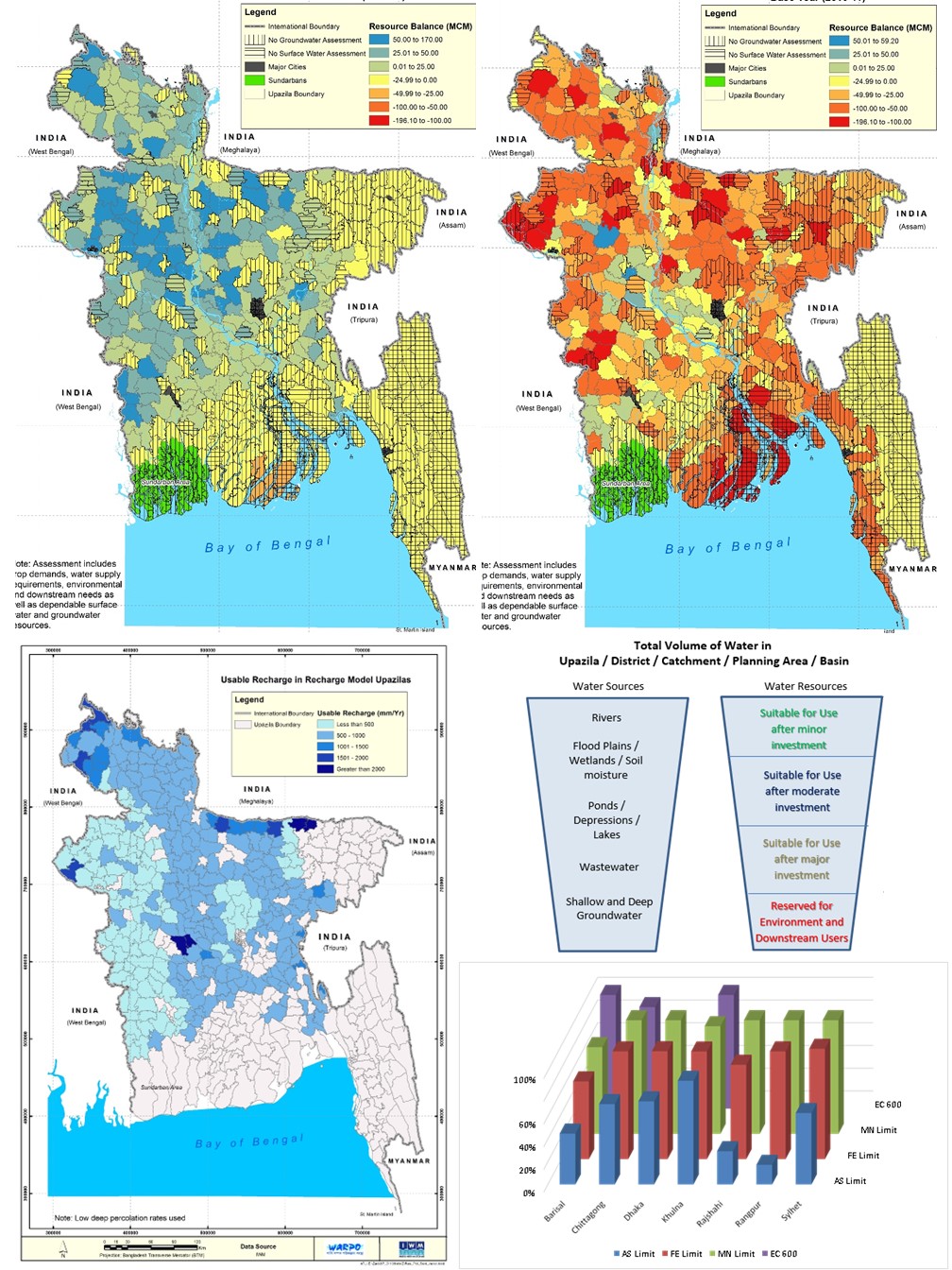
Bangladesh Maritime University (BMU), the first and only maritime university in Bangladesh (3rd in South Asia and the 12th in the world), was established on 26 October 2013 to support the nation’s strategic aspirations in maritime education, research, and human resource development. In order to accommodate its expanding academic functions and long-term institutional vision, the Government of Bangladesh allocated approximately 106.66 acres of land at Char Rangamatia and Bakolia Mouja under Bandar Thana, Chattogram, Bangladesh, for the development of a permanent and fully integrated university campus. To translate this vision into reality, the project titled “Preparation of Master Plan, Architectural Design, Detail Design, Drawings, Bill of Quantities (BoQ), Tender Documentation and Construction Supervision of Bangladesh Maritime University Permanent Campus” was undertaken.
The assignment was implemented over a period of 48 months, from July 2019 to June 2022, and then extended to June 2023, with Bangladesh Maritime University as the client and the Institute of Water Modelling (IWM) as the consulting firm. IWM deployed a highly skilled, multidisciplinary team comprising urban planners, architects, structural and civil engineers, water supply and drainage specialists, environmental experts, and education professionals. Throughout the project lifecycle, IWM demonstrated exceptional technical competence, coordination capacity, and commitment to quality, ensuring the successful delivery of all project components.
The project was executed in two distinct phases. Phase I focused on the preparation of the master plan, architectural and engineering designs, detailed drawings, Bills of Quantities (BoQs), cost estimates, and tender documentation. This phase involved comprehensive topographic and digital surveys, geotechnical investigations, land-use analysis, and environmental considerations. IWM developed a well-structured master plan that ensured optimal land utilization, functional zoning, circulation efficiency, environmental sustainability, and provision for future expansion.
The campus development plan encompassed a total of 49 buildings and infrastructure components, including academic and administrative buildings, river and canal embankments, laboratories and simulator centers, senate and convocation facilities, student dormitories, faculty and staff housing, medical and recreational facilities, mosques, internal road networks, bridges, utility services, and associated support infrastructure. Particular emphasis was placed on integrated water supply, drainage, firefighting, and utility systems, areas in which IWM’s specialized expertise added significant value to the project.
Phase II comprised comprehensive construction supervision services, including both top-level oversight and continuous site supervision of landfilling and embankment implementation works in the field. IWM ensured strict compliance with approved designs, technical specifications, construction schedules, quality standards, and safety requirements. The firm also prepared detailed as-built drawings for completed works, contributing to effective asset management and future operation of the campus.
Overall, the project stands as a benchmark example of integrated campus planning and implementation. IWM’s extraordinary performance across planning, design, documentation, and construction supervision ensured the delivery of a modern, functional, and sustainable permanent campus for Bangladesh Maritime University. The project significantly strengthens the physical and institutional foundation required to advance maritime education and capacity building in Bangladesh.
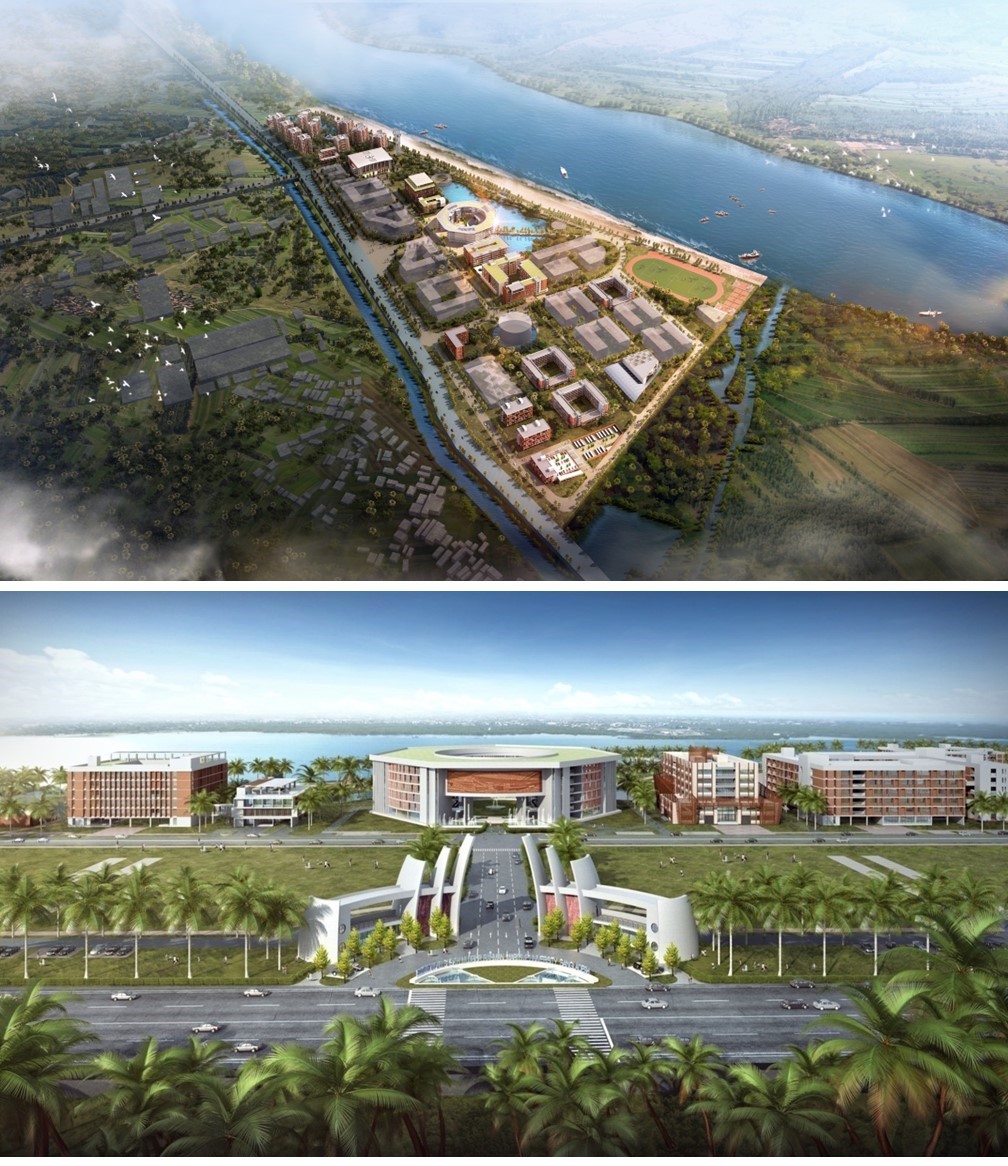
Dhaka North City Corporation (DNCC) was established in 2011 following the division of Dhaka City Corporation into North and South. In 2016, eight Union Parishads, i.e., Beraid, Badda, Bhatara, Satarkul, Harirampur, Uttarkhan, Dakshinkhan, and Dumni, were incorporated, expanding DNCC’s jurisdiction from 82.63 to 197.19 square kilometers. Much of the extended area remains rural or semi‑urban, with inadequate and unplanned road and drainage networks. Flooding is recurrent, and fragmented development initiatives by multiple agencies and private developers have created congestion, environmental degradation, pollution of peripheral rivers, and socio‑economic challenges. To address these issues, DNCC engaged the Institute of Water Modelling (IWM) to conduct a comprehensive study on options for road and drainage network improvement. The study assessed existing conditions and prepared short, mid, and long‑term improvement plans. Surveys included topographic, traffic, socio‑economic, subsoil, and satellite image analyses, supported by GIS database development and Digital Elevation Models. Primary designs for roads, stormwater drains, utility ducts, and street lighting were prepared, along with cost estimates and economic and financial analyses.
The study emphasized that road spaces should be treated as multipurpose urban corridors, accommodating vehicles, pedestrians, utilities, and disaster response. A block‑based planning approach was adopted, integrating peripheral roads, drainage systems, and utility ducts with Rajuk’s Regional Development Plan and DTCA’s Strategic Transport Plan. Reinforced concrete stormwater drains with spherical bottoms were proposed to minimize sedimentation, supported by silt traps and compact manholes. Precast structures were recommended to ensure quality and reduce installation time. Natural khals, identified as critical drainage assets, were recommended for immediate protection, with walkways, bicycle lanes, and demarcation pillars to safeguard future flood levels.
To manage traffic, two major north–south corridors and eight east–west connections were proposed, including six‑lane roads with bus lanes, bicycle facilities, and green strips. Grade‑separated intersections such as cloverleafs, overpasses, and underpasses were recommended, alongside integration with mass transit networks. Development was structured into three phases (2017–2030) with an estimated cost of Tk. 10,666.86 crore, plus Tk. 6,000 crore for land acquisition. Economic analysis confirmed feasibility, with an internal rate of return of 18.1 percent overall. The study concluded that DNCC must move beyond short‑term approaches toward long‑term sustainable urban management. Institutional strengthening, coordinated planning, and proper solid waste management were identified as essential for resilience and sustainability.
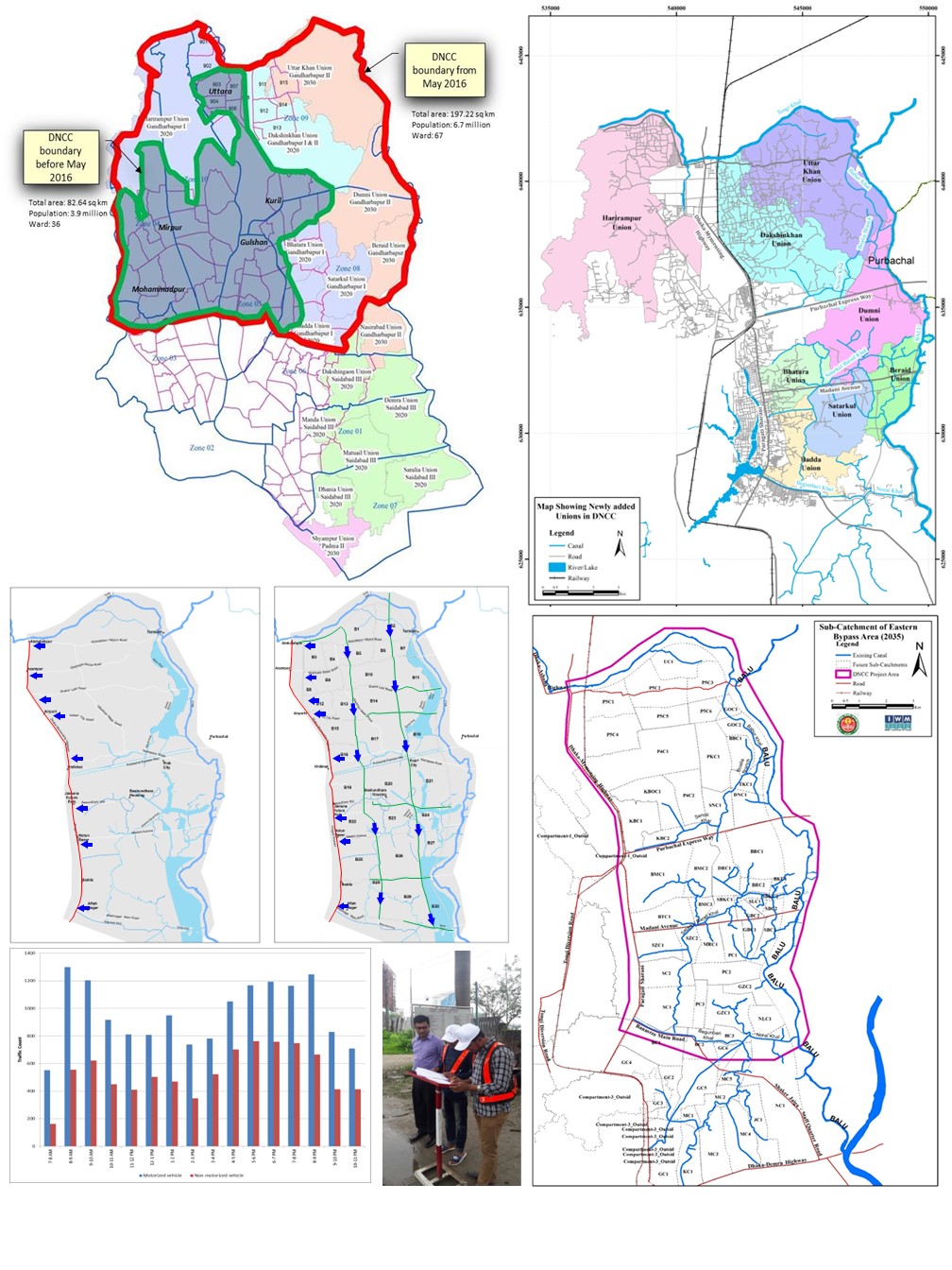
The Institute of Water Modelling (IWM) had undertaken the Feasibility Study of Surface Water Treatment Plant for Rajshahi WASA (RWASA) to address the growing demand for safe drinking water in Rajshahi city and surrounding areas. At the time, the city relied heavily on groundwater, which was increasingly contaminated with manganese, iron, and hardness, and extraction levels were declining. Existing surface water facilities operated only seasonally due to siltation problems. The study had therefore aimed to identify a sustainable intake site on the Ganges River, assess future demand up to 2035, and design a comprehensive plan for surface water treatment and distribution to meet the needs of an expanding urban population.
The study had involved extensive technical investigations, including river bathymetry and topographic surveys, water quality sampling, geotechnical studies, and detailed assessments of the existing distribution network. IWM had updated its morphological models to evaluate erosion and sedimentation risks at potential intake sites, and carried out demand projections under different socio‑economic scenarios. The Godagari site had been identified as the most feasible intake location, based on bank stability, water availability, and favourable modelling results. Options for treatment plant sites, booster pump stations, transmission mains, and distribution systems had been developed, alongside outline designs for infrastructure and protective works. Financial and economic analyses had been conducted to compare supply options, with phased construction and operation of a 200 MLD treatment plant recommended as the most viable solution.
The project had also included environmental and social impact assessments, stakeholder consultations, and preparation of management plans. Land acquisition requirements had been identified, and mitigation measures proposed to minimise adverse impacts during construction and operation. The estimated capital cost of the recommended option had been about US$ 309 million, with phased investment and repayment strategies analyzed for affordability. By integrating technical modelling, infrastructure design, financial feasibility, and environmental safeguards, the study provided RWASA with a clear roadmap for shifting from unsustainable groundwater dependence to a reliable surface water supply. It had laid the foundation for long‑term resilience in Rajshahi’s water system, ensuring safe and adequate drinking water for a projected population of over two million by 2035.
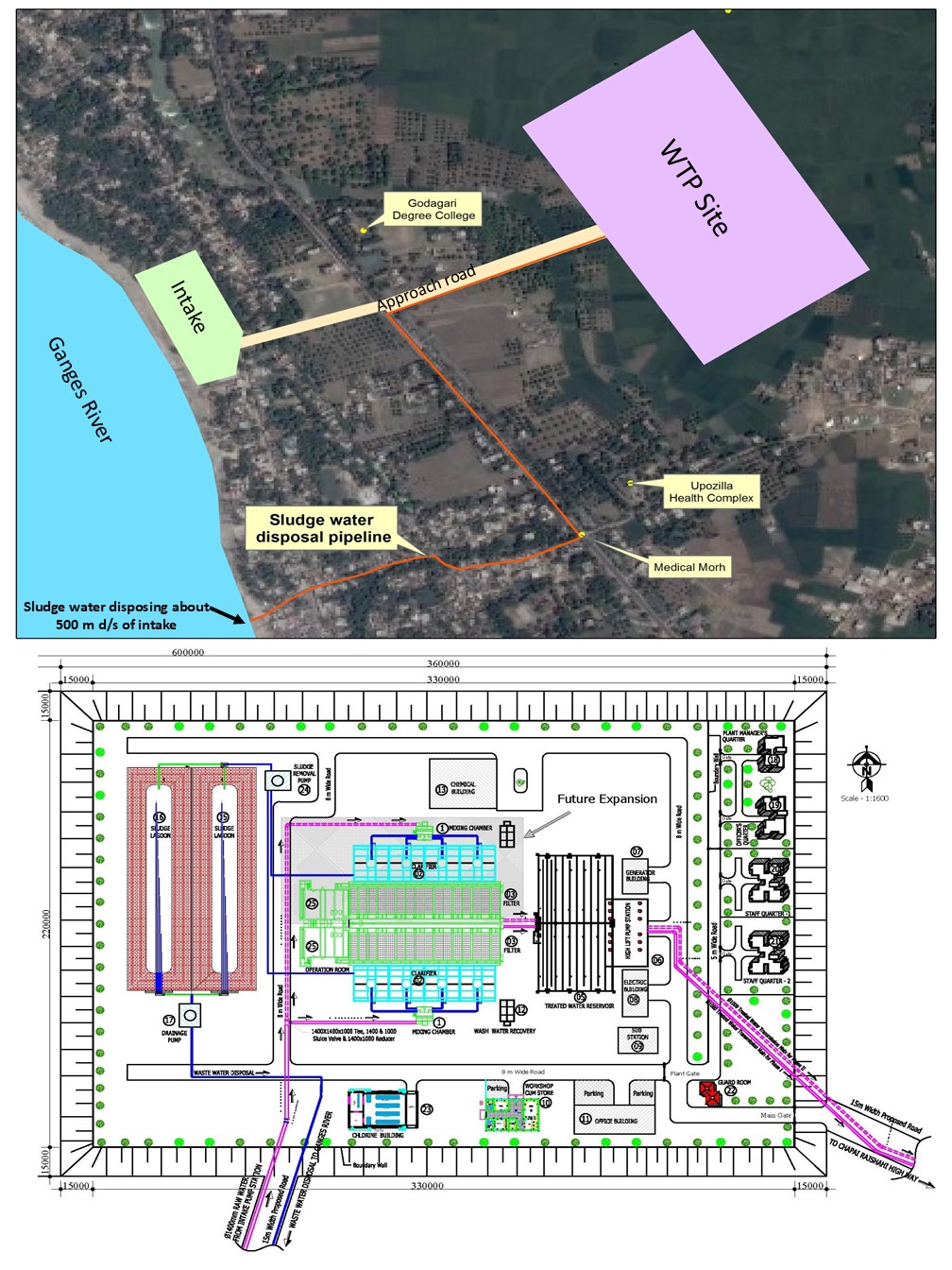
The Institute of Water Modelling (IWM) conducted a comprehensive feasibility study on flood management and drainage congestion reduction in Sylhet Metropolitan Area. The project was initiated under the sponsorship of the Ministry of Local Government, Rural Development and Co-operatives, with Sylhet City Corporation (SCC) as the implementing agency. The study was undertaken in response to severe flooding and waterlogging events, particularly the prolonged flood of 2022, which highlighted the vulnerability of Sylhet’s drainage system and the Surma River’s influence on stormwater management. The project aimed to investigate existing problems, assess previous interventions, and recommend technically sound, socially acceptable, and environmentally sustainable solutions. It also emphasized capacity development for SCC professionals to ensure long-term resilience. The study area covered 79.50 km² across 42 municipal wards, divided by the Surma River, and required detailed hydrologic and hydrodynamic modelling to evaluate drainage performance under different rainfall scenarios.
The technical analysis identified critical weaknesses in Sylhet’s drainage infrastructure, including undersized culverts, encroached canals, and inadequate drain capacity. Calibrated models were developed to simulate rainfall events of 2022–2023 and design storms with 10 and 25-year return periods. Based on these analyses, a set of structural interventions was proposed. These included rehabilitation and diversion of chharas/khals, construction of pump stations with regulators, installation of silt traps, re-sectioning of 50 km of canals, and reconstruction of 35 bridges and culverts to remove bottlenecks. Flood protection measures were also recommended, such as raising 25 km of road embankments and constructing 10 km of flood walls along the Surma River. The project further proposed rehabilitation and expansion of primary and secondary drains, covering 25 km, and acquisition of approximately 18,000 decimals of land for pump stations, silt traps, and canal protection. The interventions were designed to improve stormwater conveyance, reduce waterlogging, and enhance climate resilience while minimizing environmental impacts.
The project was planned in two phases: Phase I (July 2025–June 2029) and Phase II (July 2027–December 2030), with estimated costs of BDT 4,468.38 crore and BDT 2,746.53 crore, respectively. Phase I focused on immediate structural measures such as pump stations, regulators, silt traps, canal protection works, and flood walls, while Phase II emphasized long-term expansion and land acquisition for South Surma khals. The cost estimation was prepared using the PWD Rate Schedule 2022, supplemented by BWDB and LGED rates, and included contingencies, consultancy services, and equipment procurement. The study concluded that effective drainage management would significantly reduce congestion, improve public health, support economic growth, and enhance Sylhet’s resilience against climate change. By combining engineering solutions with community participation, the project was expected to transform Sylhet into a cleaner, safer, and more sustainable city.
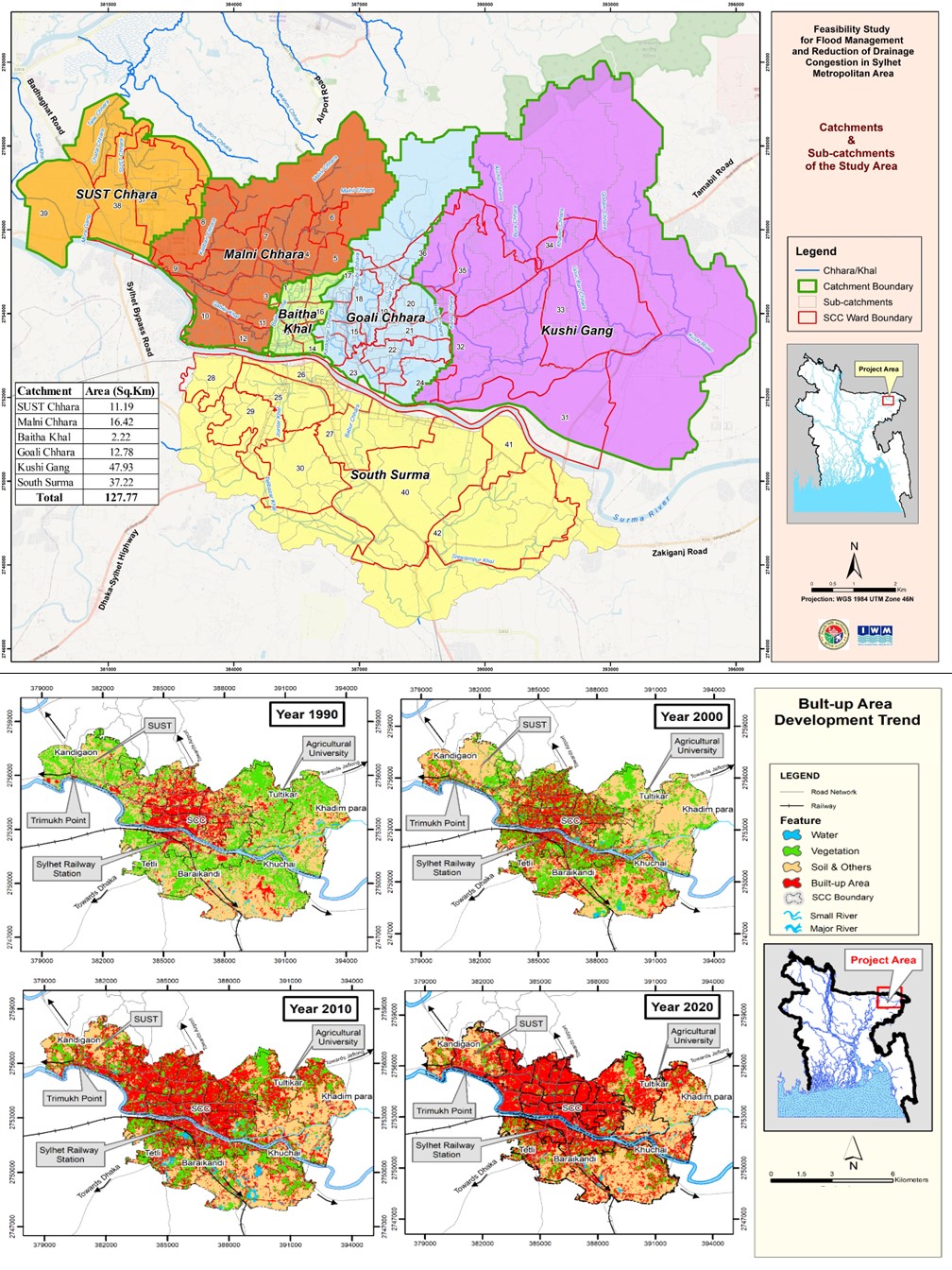
Main project features:
Population Served: Design population is 5,438,762 (or approx. 5.43 million)
DMA / Water supply scheme: design and supervision of 47 nos. DMAs
Water network: Installation of 2,436km of HPDE pipes, 106,662 nos. house connections
Demarcation of 87 DMAs covering 12.3 million residents in Dhaka city MODS Zones 106,662 house connections with legalization of illegal connections and ensure 24/7 water supply.
Scope of services:
Conducted topographic and socio-economic surveys and updated demographic projections
Performed a feasibility study for the Gandharbapur Water Treatment Plant (500 MLD)
Piloted a project to determine non-revenue water in the existing Dhaka WASA system
Prepared hydraulic modeling, BoQ, and bid documents for design and implementation
Design Phase:
Reviewed and approved documents for topographic, socio-economic, and production tubewell surveys
Reviewed and approved hydraulic models, cost variations, and design documents
Reviewed and approved the Environmental and Social Safeguard Study
Supervised construction of water supply systems, covering installation of pipes, house connections, and production tubewells, chambers.
Supervised installation of 7,800 gate valves, approx. 150 surface water inlet chambers, and over 106,662 house connections
Conducted performance tests, commissioning, preparation of as-built documents, and post-construction model for future operations
Handed over completion reports and certificates to the client
Project management and performance evaluation
Administration and management support of PMU to successfully implement and performance evaluation of the project and contribute to achieve the project objective.
Support Dhaka WASA in design and procurement process for project packages and upcoming projects.
Capacity building of Dhaka WASA employees for water network modelling, GIS, DMA management etc.
This study addresses the pressing water supply needs of forcibly displaced Myanmar nationals (FDMNs) in the Rohingya refugee camps in Cox's Bazar, Bangladesh, and nearby host communities. Since 2017, over a million FDMNs have faced severe challenges due to inadequate access to clean water and sanitation. The existing borehole and handpump systems struggle with uneven distribution and water quality issues, creating significant public health concerns. Collaborative efforts by UNICEF, OXFAM, and UNHCR have resulted in initiatives like the Water Master Plan and community-managed networks, but gaps in safe drinking water access remain. This project aims to enhance water supply infrastructure while fostering social cohesion between camp residents and host communities.
The study involves comprehensive planning, evaluation, and design of piped water systems based on extensive field surveys, topographic studies, hydrogeological investigations, and stakeholder consultations. Key outputs include 39.114 km of HDPE pipes, 327 tap stands, and 199 household connections, supported by solar-powered systems for sustainable energy. Designed for a daily water demand of 1276.26 cubic meters, the infrastructure includes 37 water tanks and 3 overhead tanks. Groundwater serves as the primary source, with hydrogeological data guiding the optimal location and design of water networks.
Aligned with SDG 6.1.1, this project prioritizes equitable access to clean water while addressing population growth and water demand projections. By finalizing the chlorinated piped water supply for the Roithkong site, the study emphasizes ensuring a sustainable solution for the host community, which is critical to meeting the project’s objectives and fostering long-term social and environmental benefits.
The World Bank had employed the Institute of Water Modelling (IWM) for the project on Industrial Environmental Compliance and Pollution Control in Greater Dhaka. The study had been undertaken to support the Government of Bangladesh (GOB) in reducing pollution of water bodies caused by industrial effluents. Its overall goal had been to develop an effective approach to pollution reduction through improved understanding of the impacts of industrial discharges and the potential benefits of control measures. These included end‑of‑pipe wastewater treatment, cleaner production technologies, stronger legislation and enforcement, awareness‑raising among regulators and industries, partnerships between government, private sector, and communities, and appropriate economic and financing mechanisms to implement pollution reduction measures.
Phase I of the study had concentrated on technical aspects and industrial pollution management. It had assessed the existing pollution situation, analyzed current management systems, and identified preliminary technical interventions. Specific tasks had included mapping and characterizing industrial effluent sources, evaluating contributions from domestic wastewater and agricultural runoff, and identifying major pollution hotspots in the Dhaka watershed. Using surface water and groundwater models, the study had examined the impacts of effluent streams at basin and sub‑basin levels, determined vulnerability zones, and tested pollution reduction scenarios. Recommendations had been developed based on technical, economic, and institutional feasibility, with preliminary options proposed for reducing pollution at critical hotspots. In addition, the study had reviewed the compliance framework and suggested improvements to strengthen industrial pollution control in Greater Dhaka.
The Dhaka watershed, covering approximately 1,500 km² and including major rivers such as the Buriganga, Lakhya, Turag, and Dhaleswari, had been the focus of the assessment. Six key hotspots had been identified, including Chandnighat and Saidabad water treatment plant intakes, Rupganj, Rekabi Bazar, Hemayetpur, and Gazipur. A phased program of interventions had been recommended, prioritizing clean‑up of river stretches at critical water supply intakes, followed by remediation of Hemayetpur, Rekabi Bazar, and Rupganj, and ultimately extending to the entire river system. Analyses had shown that biodegradable organic pollutants were the main cause of water quality deterioration, with dissolved oxygen (DO) levels used as a key indicator. Modelling had demonstrated that maintaining DO above 4 mg/l would ensure acceptable water quality. The study had also explored treatment train options for effluent management, providing a foundation for long‑term pollution control strategies in Greater Dhaka.
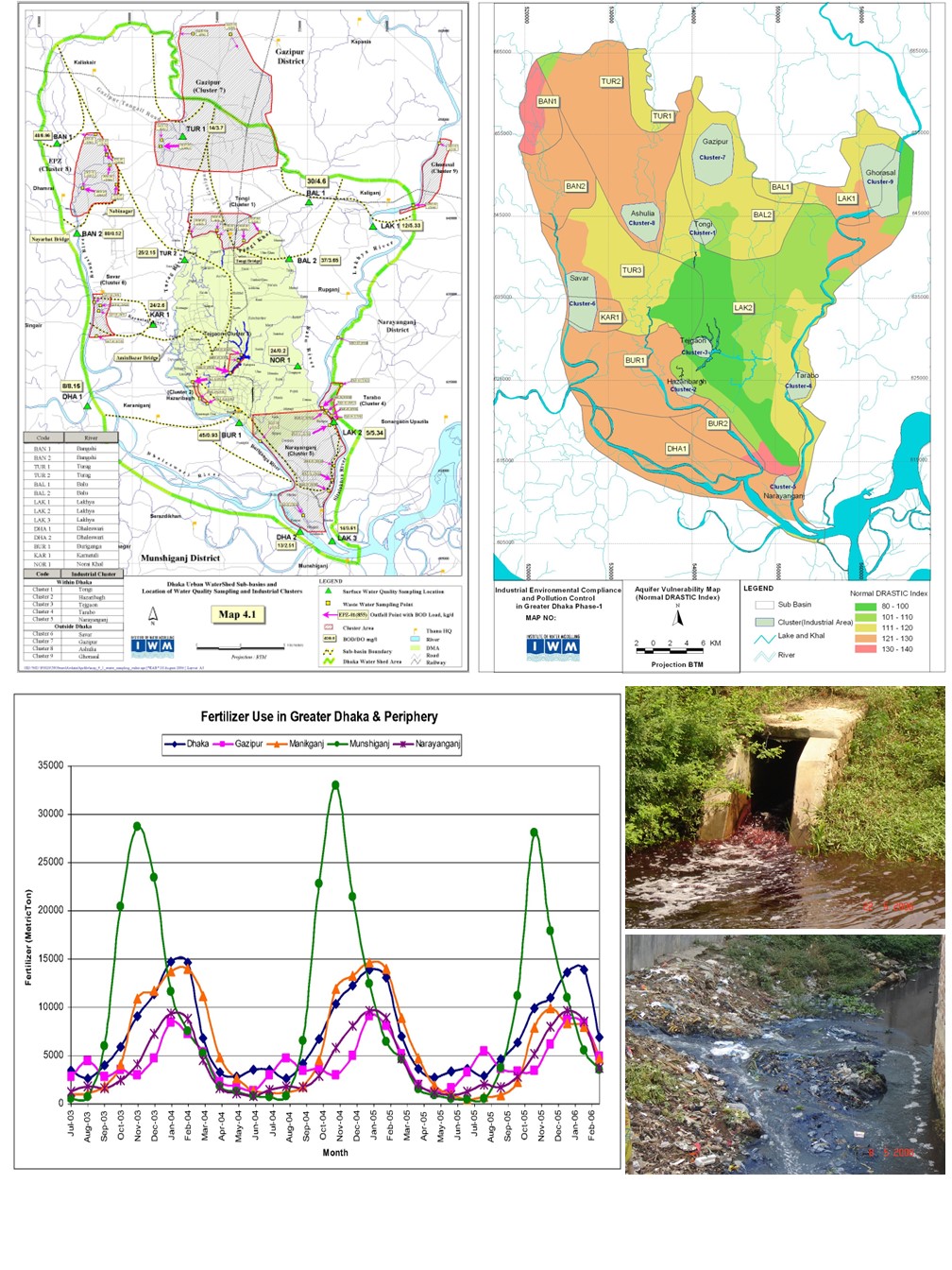
The National Special Economic Zone (NSEZ) is the first multi-sector economic zone in Bangladesh, comprising an area of around 30,000 acres, located in Mirsarai Upazilla of Chattogram district and Sonagazi Upazilla of Feni district. The economic zone has high potential to be one of the driving forces for the national economy due to its strategic location. Bangladesh Economic Zones Authority (BEZA) has initiated implementation activities for the construction of a 50 MLD WTP, including intake, raw water transmission main, treated water transmission main and distribution networks for supplying water to the priority zones of NSEZ. The Project is funded by the Government of Bangladesh (GoB) and is being implemented following the FIDIC (Plant and Design-Build) method of procurement. In this respect, BEZA has engaged the Institute of Water Modelling (IWM) as the Engineer of the project.
The purpose of the project is to construct a new water treatment plant at Poshchim Ichakhali, Mirsarai, Chattogram, to supply about 50 MLD water to NSEZ. The Contract phases contain the following Components:
Component I: Detailed design, procurement and construction of 105 MLD raw water intake comprising of intake structure, intake pump station, stand-by generator, riverbank protection works and other associated works at the left bank of the Feni River at Azampur, Mirsarai, Chattogram. However, the scope of procurement and installation of mechanical and electrical equipment, including stand-by generators, will be based on the nominal capacity of intake 52.5 MLD.
Component II: Detailed design, procurement and construction of a conventional 50 MLD surface water treatment plant at Poshchim Ichakhali, NSEZ, Mirsarai, Chattogram, comprising pre-chlorination, flocculation, clarifying, filtration, post-chlorination, clear-water storage, treated water pumping station, stand-by generators, etc. The treatment plant must be able to treat raw water from the existing source to meet the WHO Guidelines (2011) for Drinking Water Quality and the Bangladesh standard (ECR 1997) throughout the year (Jan-Dec) for all parameters.
Detailed design, procurement and construction of facilities like the administration building, Complaint centre, laboratory, Conference room, Power generation building, Central Control room, Communication system, Staff Housing & Facilities, internal road and drainage network, SCADA system, chemical store, generator building, staff canteen and other facilities. Ground filling and levelling as required, and foundation treatment will only be carried out in the areas required by the initial nominal 50MLD capacity.
Component III: Detailed design, procurement and construction of 9.6 km Raw Transmission Main of 1000mm dia from Azampur to treatment plant, including design, procurement and construction of around 40 km Treated Water Transmission and distribution main from treatment plant to priority Zones (2A, 2B, 3, 4 & 5) of the NSEZ.
Component IV: Operation and Maintenance Works (O&M) of Component I, II & III for a period of three (03) years, including one year defects notification period. The defect notification period will be started after commissioning, performance test, and acceptance of the works and after issuance of the taking over certificate.
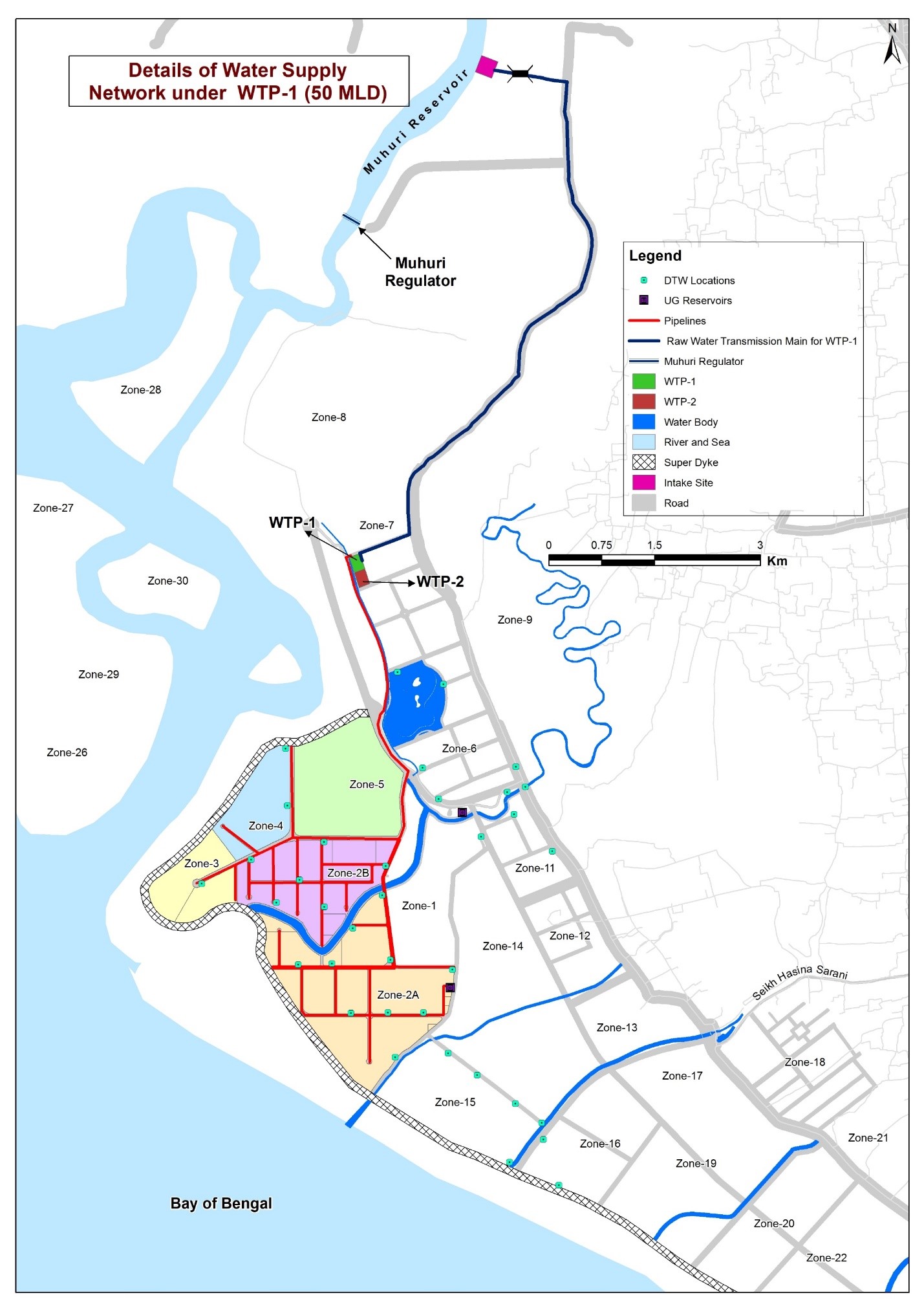
RAJUK is implementing the Purbachal New Town Project (PNTP), the largest planned township in Bangladesh, with the objective of creating a modern and sustainable urban settlement. As part of this initiative, RAJUK is developing a comprehensive water supply system through a Public–Private Partnership (PPP) with United Delcot Water Ltd. (UDWL). This is the first water supply project in Bangladesh to be carried out under the PPP model, setting a milestone for future infrastructure development in the country. The Institute of Water Modelling (IWM) is acting as the Independent Engineer, providing technical guidance and oversight to ensure the project’s successful implementation and monitoring of Key Performance Indicators (KPIs) during the operation and maintenance phase.
The project is designed to supply safe drinking water to nearly 1.6 million inhabitants of PNTP by the target year 2050. It will deliver a capacity of 340 million liters per day through a water distribution network of about 500 km in length, constructed along the township’s 320 km road system. The system will be supported by 15 deep tube wells, pump houses, a six‑storied administration building, and a one‑storied workshop building to facilitate maintenance activities and ensure long‑term reliability. During the initial phase up to 2030, water will be supplied from the deep tube wells, while after 2030, the system will be augmented by a centralized surface water treatment plant to meet the growing demand and enhance sustainability.
The PPP project has been structured with a construction period of four years, followed by an eleven‑year operation and maintenance phase. A key innovation in the project is the integration of a Supervisory Control and Data Acquisition (SCADA) system, which will enable smart operation of the water supply network. Through SCADA, real‑time monitoring of pressure and water quality will be achieved, allowing for automated control, efficient energy use, and rapid response to system anomalies. This digital infrastructure will transform the PNTP water supply into a modern, resilient, and intelligent utility, ensuring that the township’s residents benefit from reliable and safe water services for decades to come.
IWM’s responsibilities in this project extend from design review and technical verification to construction supervision, contract administration, progress monitoring, and environmental and social safeguards compliance. IWM is overseeing all the testing, commissioning, and performance verification of all project components, while also ensuring readiness for operation and maintenance through the review of manuals, asset registers, and KPI adherence reports. By combining technical rigor with independent oversight, IWM is providing assurance that the project meets national standards, international codes, and contractual obligations, thereby ensuring the delivery of a reliable, sustainable, and resilient water supply system for the future residents of Purbachal.
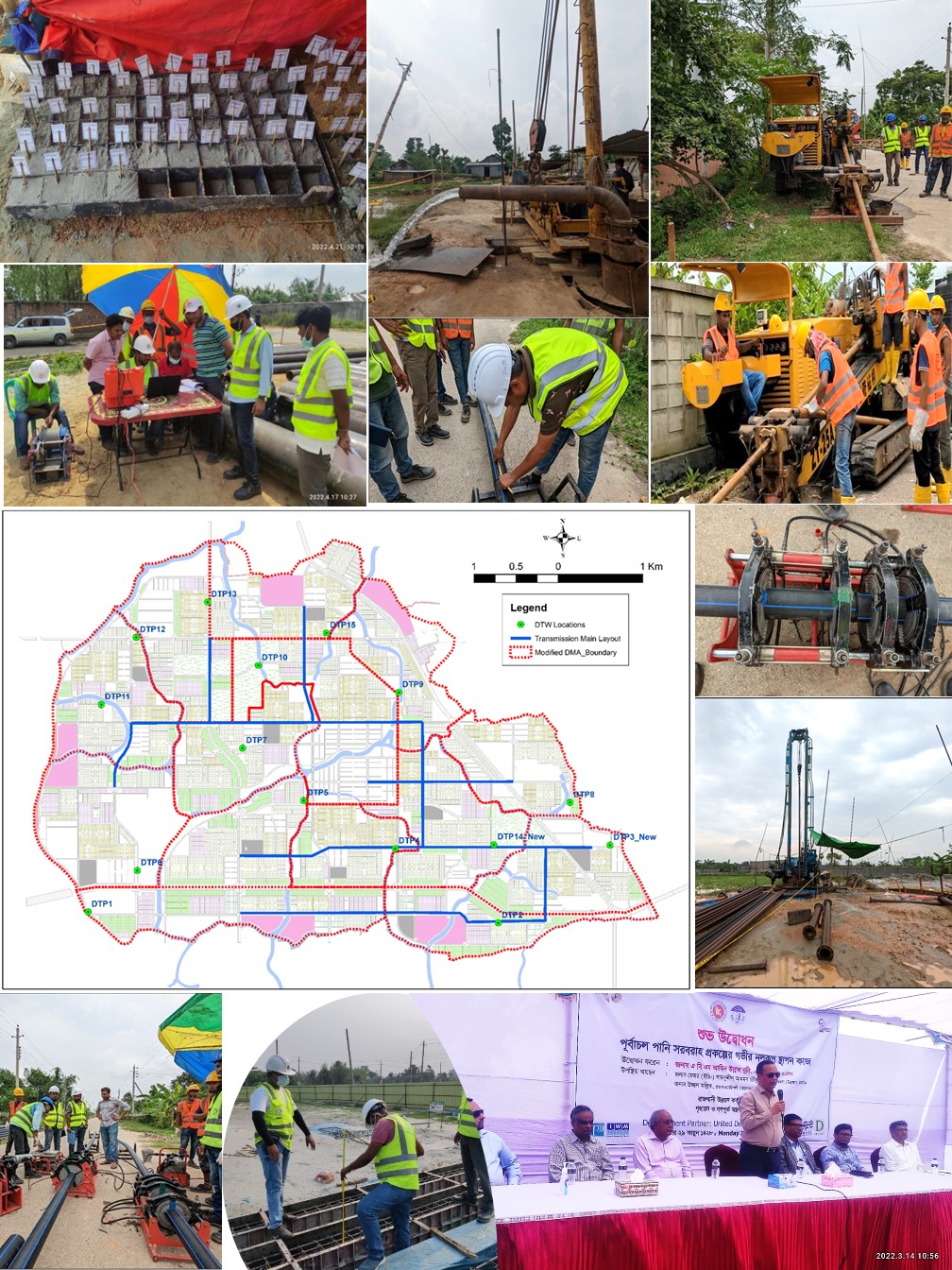
Sustainable groundwater development requires balancing natural recharge, abstraction, and aquifer reserves to protect long-term integrity. Hydrogeological, environmental, and operational factors govern this balance, making continuous monitoring essential. In Dhaka City, where groundwater has long been the primary municipal water source, systematic monitoring of production wells is critical to control costs, prevent premature tubewell failure, and ensure effective resource management. Dhaka, one of the fastest-growing megacities worldwide, had a population exceeding 12 million in 2010 and is projected to reach nearly 19.5 million by 2030 (BBS). By 2017, groundwater supplied about 79% of total demand, or 2,546 million liters per day. This heavy reliance has severely stressed the aquifer system, threatening long-term sustainability.
Resource Assessment Studies in 2004–2005 highlighted the urgent need for monitoring. In response, Dhaka Water Supply and Sewerage Authority (DWASA) employed the Institute of Water Modelling (IWM) to establish a monitoring network. Fifteen cluster piezometers, each with shallow and deep observation wells, were installed at strategic sites. Though the project ended in 2007, IWM continued monitoring until 2009, producing valuable insights into depletion trends. Recommendations included continuous monitoring, reduced pumping in stressed zones, relocation of wells to peripheral areas, periodic shutdowns for aquifer recovery, registration of private wells, and improved construction practices. Yet unregulated abstraction by industries, particularly textiles, continued to accelerate decline. In some areas, groundwater levels dropped to 88 meters below ground. Meanwhile, surrounding rivers such as the Buriganga, Turag, Balu, and Sitalakhya became heavily polluted, raising contamination risks.
Recognizing these challenges, DWASA re-engaged IWM in 2015 to strengthen monitoring. The project was implemented in two phases. Phase 1 involved reviewing the existing network, regenerating nine wells, rehabilitating six, and constructing four new cluster wells, increasing the total to nineteen. Reference levels were standardized to mean sea level, automatic instruments deployed, and hydrochemical analyses conducted. Capacity and efficiency assessments were performed for twenty-five DWASA production wells, alongside training and technology transfer. Phase 2 focused on regular monitoring of groundwater levels, quality, and production wells. Completed in June 2021, it was followed by IWM’s continued support until mid-2022, ensuring uninterrupted monitoring and a smooth transition of responsibilities to DWASA. These efforts significantly enhanced DWASA’s institutional capacity, enabling evidence-based decision-making and laying the foundation for sustainable groundwater management in Dhaka.
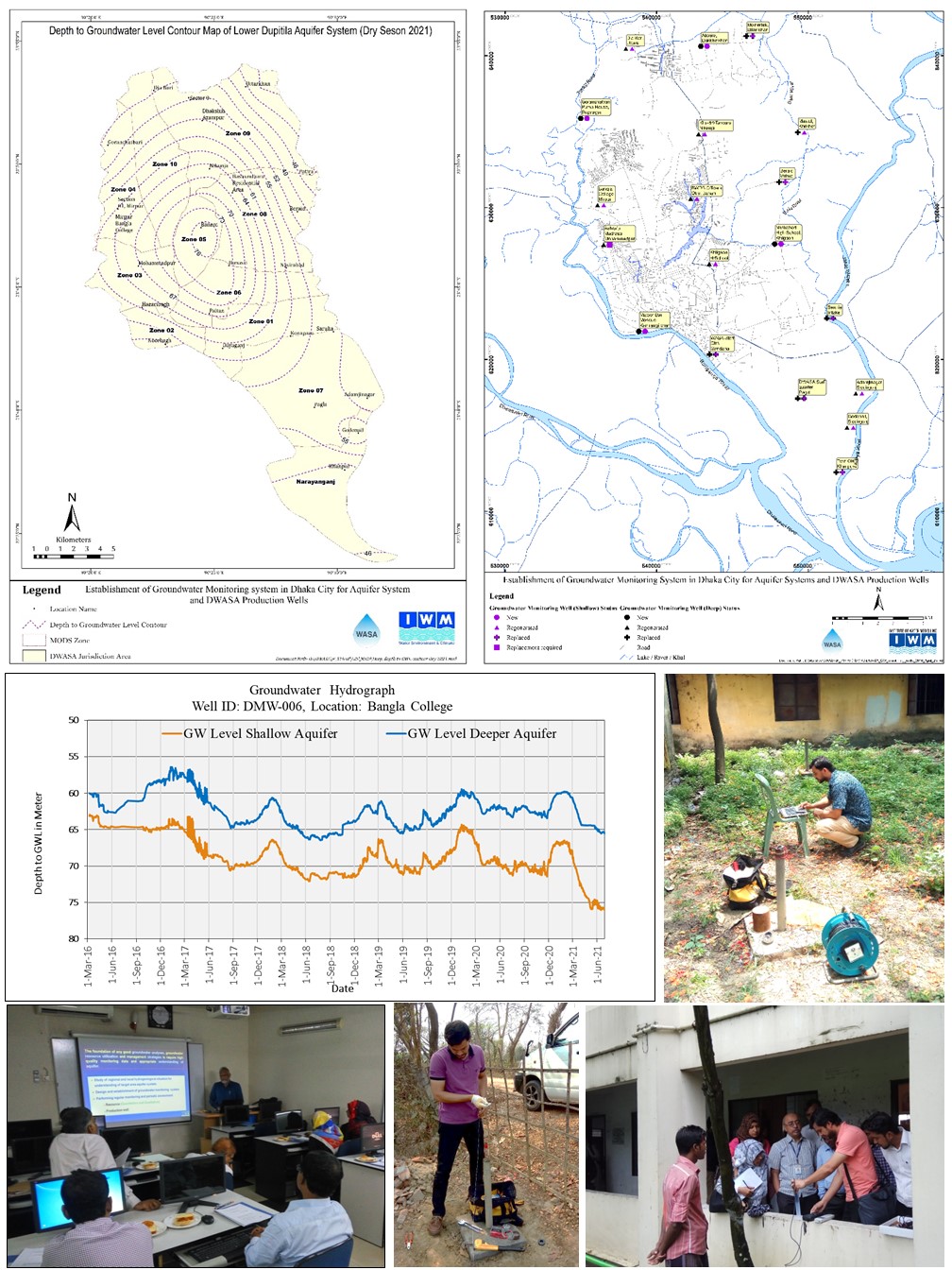
Rohingya refugees in Bangladesh are primarily Forcibly Displaced Myanmar Nationals (FDMNs) who fled violence in Rakhine State in August 2017, resulting in overcrowded camps with urgent humanitarian needs, including safe water, sanitation, food, and education. To address critical WASH and public health challenges, the WASH Sector in Cox’s Bazar, in collaboration with OXFAM and UNHCR, introduced a Water Master Plan (2019), establishing small-scale water networks to meet basic needs. By 2022, most networks were constructed through joint efforts by DPHE, I/NGOs, and the private sector.
With networks in place, the WASH Sector planned a review to assess functionality, quality, and operational challenges. UNICEF initiated this assignment and contracted the Institute of Water Modelling (IWM) on 21 May 2023.
The project undertook a systematic assessment of 298 nos. water supply networks across 33 Rohingya camps in Ukhiya and Teknaf of Cox’s Bazar District of Bangladesh, focusing on functionality, service coverage, and water quality while identifying operational challenges and good practices. The scope of work included reviewing all existing water supply scheme documentation, developing standardized assessment tools and questionnaires, and building the capacity of enumerators to ensure high-quality data collection. The assessment examined critical technical and service delivery parameters, including pump discharge capacity, energy supply systems, water reservoir volume and structural condition, water treatment processes, and water quality indicators such as free residual chlorine levels.
In addition to technical assessments, beneficiary satisfaction surveys were conducted to capture the perspectives of camp residents on service reliability, accessibility, and overall system performance. This community-focused component ensured that the assessment reflected both operational realities and user experiences, providing a comprehensive understanding of how water services are functioning on the ground.
Collected data were carefully analyzed and presented through fact sheets, analytical tables, graphs, and geospatial maps, supporting evidence-based decision-making. Findings were validated during a multi-stakeholder workshop involving WASH Sector partners, enabling feedback and discussion of key insights. These validated results were compiled into a consolidated final report containing prioritized and actionable recommendations for programmatic improvement.
The assessment provides a robust evidence base to guide programmatic planning, funding allocation, and operational priorities for water supply services in the Rohingya refugee camps. The findings will inform targeted interventions for the remainder of the year, enhancing the sustainability, efficiency, and resilience of water supply systems. Ultimately, this work supports the delivery of safe and reliable water to refugee communities and ensures that future WASH programming is evidence-based and responsive to both operational and beneficiary needs.

Trust Green City (TGC) is a township project of the Army Welfare Trust (AWT), envisioned as a smart, sustainable community that integrates modern technology, green spaces, and essential civic amenities. Located on 388 bighas of land in Baunia, adjacent to Uttara Sector 17 and Mirpur DOHS, the township is strategically positioned near Hazrat Shah Jalal International Airport with multiple access points through Jashimuddin Road, MRT stations, and surrounding neighborhoods. The project aims to set a benchmark for environmentally friendly urban living in Bangladesh, aligning with national Sustainable Development Goals (SDGs).
To realise this vision, Army Welfare Trust engaged the Institute of Water Modelling (IWM) to prepare a comprehensive feasibility study, detailed designs, and cost estimates for the city’s utility infrastructure. The assignment covered six major components: water supply, sewerage, stormwater drainage, electricity distribution, gas supply, and road networks.
For the water supply system, IWM conducted topographic surveys, reviewed past DWASA studies, estimated demand up to 2050, and developed hydraulic models optimised with District Metered Area (DMA) concepts. Detailed designs included pipeline profiles, valve chambers, and house connections, supported by BoQ preparation and tender documentation. The sewerage system involved load estimation, hydraulic modelling, wastewater quality assessment, and design of collection networks and treatment facilities, ensuring sustainable disposal. The stormwater drainage system was designed using rainfall analysis, topographic data, and Goranchatbari pump station records, with layouts accommodating flows from adjacent localities. For the electricity supply network, IWM prepared load assessments, option analyses for underground and overhead distribution, and designs for 33 kV transmission lines, 11 kV backbones, transformers, and street lighting systems. The road network design included surveys, subsoil investigations, and detailed designs for primary, secondary, and internal roads, along with associated infrastructure such as footpaths, embankments, and bridges. Finally, the gas distribution system was planned through demand analysis, option studies with Titas Gas and LPG stations, and outline designs for distribution layouts.
Through this integrated study, IWM provided the Army Welfare Trust with a comprehensive framework for sustainable infrastructure development in Trust Green City. The project ensures efficient utility services, resilient urban mobility, and ecological harmony, laying the foundation for a modern township that promotes safe, inclusive, and sustainable living.
.jpg)
Dhaka, the capital of Bangladesh, is among the fastest‑growing metropolitan cities in the world, facing rapid urbanization and mounting pressure on its water resources. In 2018, Dhaka Water Supply and Sewerage Authority (DWASA) produced an average of 2,494.6 million liters per day (MLD) to serve Dhaka and Narayanganj. Of this, 1,999.3 MLD over 80 percent was abstracted from groundwater through 808 deep tube wells, while only 495.3 MLD came from surface water treatment plants. Heavy reliance on groundwater has placed severe stress on the aquifer system, raising concerns about long‑term sustainability.
Continuous over-abstraction has caused a steady decline in groundwater levels, particularly within the Upper DupiTila Aquifer, threatening the operational viability of many deep tube wells. To address this imbalance between abstraction and natural recharge, DWASA launched the project titled “The Study on Artificial Recharge to Aquifer by Rainwater Harvesting from Building Roof-Tops in Dhaka City.” The study covered the entire city, with emphasis on central zones most vulnerable due to high urban density, concentrated abstraction, and longer recharge pathways.
Under this initiative, artificial recharge structures were constructed in eight DWASA MODS Zones, while two earlier pilot facilities were rehabilitated. Site‑specific prototype designs of recharge wells were developed based on detailed hydrogeological assessments. The Institute of Water Modelling (IWM) monitored system performance for one year, collecting daily rainfall data via rooftop rain gauges and tracking groundwater levels with automated data loggers. Routine inspections and maintenance ensured reliability. Results showed improvements in groundwater levels, mitigation of aquifer mining, and enhanced water quality through dilution of contaminants. Recharge systems also reduced risks of polluted river water intrusion, lowered pumping costs, and promoted efficient use of rooftop rainwater.
The study further evaluated climate change impacts on urban drainage, estimating that 30.5 million cubic meters of runoff per year, about 4.23 percent of current runoff, could be diverted underground, offsetting projected increases in stormwater by 2025. Deliverables included hydrogeological datasets, groundwater suitability maps, prototype designs with cost estimates, operational manuals, draft policy guidelines, and pilot study reports. Overall, the project established a standardized framework for artificial recharge in Dhaka, offering a sustainable solution to reduce groundwater dependency and strengthen long‑term urban water security.
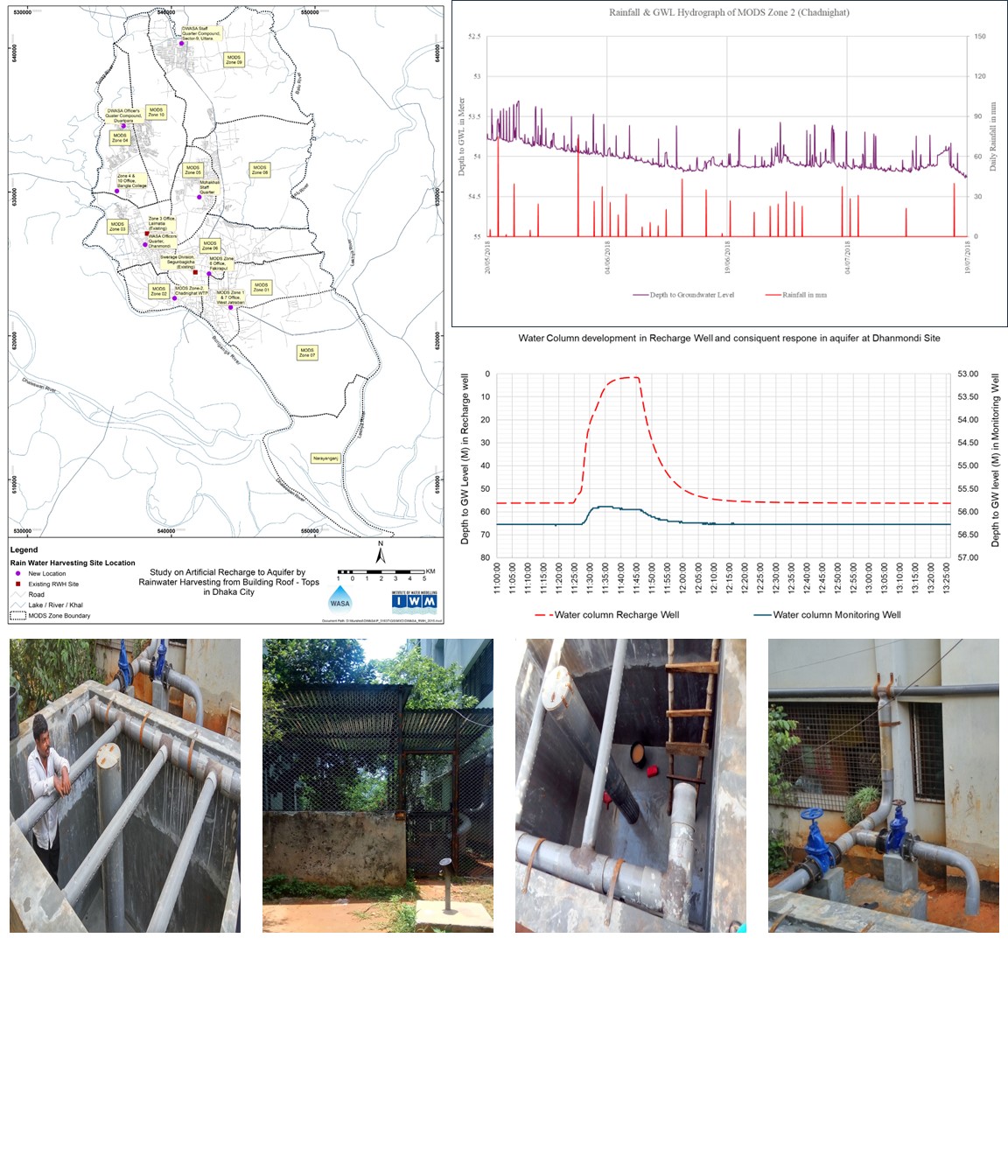
The Institute of Water Modelling (IWM), in joint venture with Pacific Consultants Co., Ltd. (PCKK), Japan, successfully completed this study with technical assistance funding from the Asian Development Bank (ADB). The project aimed to strengthen Dhaka’s long‑term water security by restoring surface waterbodies and protecting groundwater resources. Dhaka currently depends on groundwater for more than 80 percent of its municipal water supply. Over decades, abstraction has far exceeded natural recharge, causing groundwater levels to decline by 2–3 meters annually across much of the city. This imbalance threatens the sustainability of the water supply, increases pumping costs, and raises the risk of future shortages.
The study began with a comprehensive assessment of groundwater conditions using monitoring well data, production records, rainfall statistics, and land‑use maps. Findings revealed that annual abstraction exceeds 1,100 million cubic meters, while recharge contributes only a fraction of this amount. To address this, the study explored Managed Aquifer Recharge (MAR) options, focusing on lakes, ponds, and rooftop rainwater harvesting. Approximately 300 waterbodies were initially identified and assessed through desk studies, field inspections, and water quality analyses. From these, 20 key sites, including Hatirjheel, Dhanmondi Lake, Gulshan–Baridhara Lake, Uttara Diabari Lake, and retention ponds in Pallabi, Badda, Khilgaon, Demra, and Khilkhet were selected as technically suitable for recharge. Calculations showed these sites could safely contribute 4.7 million cubic meters annually (about 13 million liters per day) without compromising ecological or flood‑control functions.
Water quality assessments highlighted significant pollution in rivers and lakes during the dry season, largely from untreated sewage, solid waste, and industrial effluents. However, quality improves during monsoon months. With basic treatment measures such as sediment removal, filtration, and disinfection, water from selected lakes and ponds can be safely used for recharge. Restoration and pollution control were therefore identified as essential prerequisites for MAR. The study also evaluated rooftop rainwater harvesting. Using rainfall and building footprint data, it was estimated that systematic harvesting from large buildings could contribute over 65 million liters per day during the monsoon season. This approach not only supports recharge but also reduces urban flooding by diverting runoff.
A phased implementation strategy was proposed:
Short term: low‑risk options such as rooftop harvesting, pilot recharge pits, and small‑scale systems.
Mid-term: larger recharge structures, restoration of priority waterbodies, and integration with stormwater drainage.
Long term: MAR as a core component of Dhaka’s water management, supported by surface water treatment, wastewater reuse, and aquifer‑level governance.
A three‑dimensional groundwater model was developed to simulate aquifer responses. Results confirmed that recharge alone cannot reverse groundwater decline unless abstraction is reduced. Thus, MAR must be combined with demand management and increased use of surface water. Economic analysis showed that continuing current practices will raise long‑term costs due to deeper wells and higher energy use. In contrast, investments in MAR, waterbody restoration, and reduced abstraction are more cost‑effective.
Overall, the study established a technically sound framework for Managed Aquifer Recharge in Dhaka, offering a sustainable pathway to reduce groundwater dependency, enhance resilience, and secure the city’s future water supply.
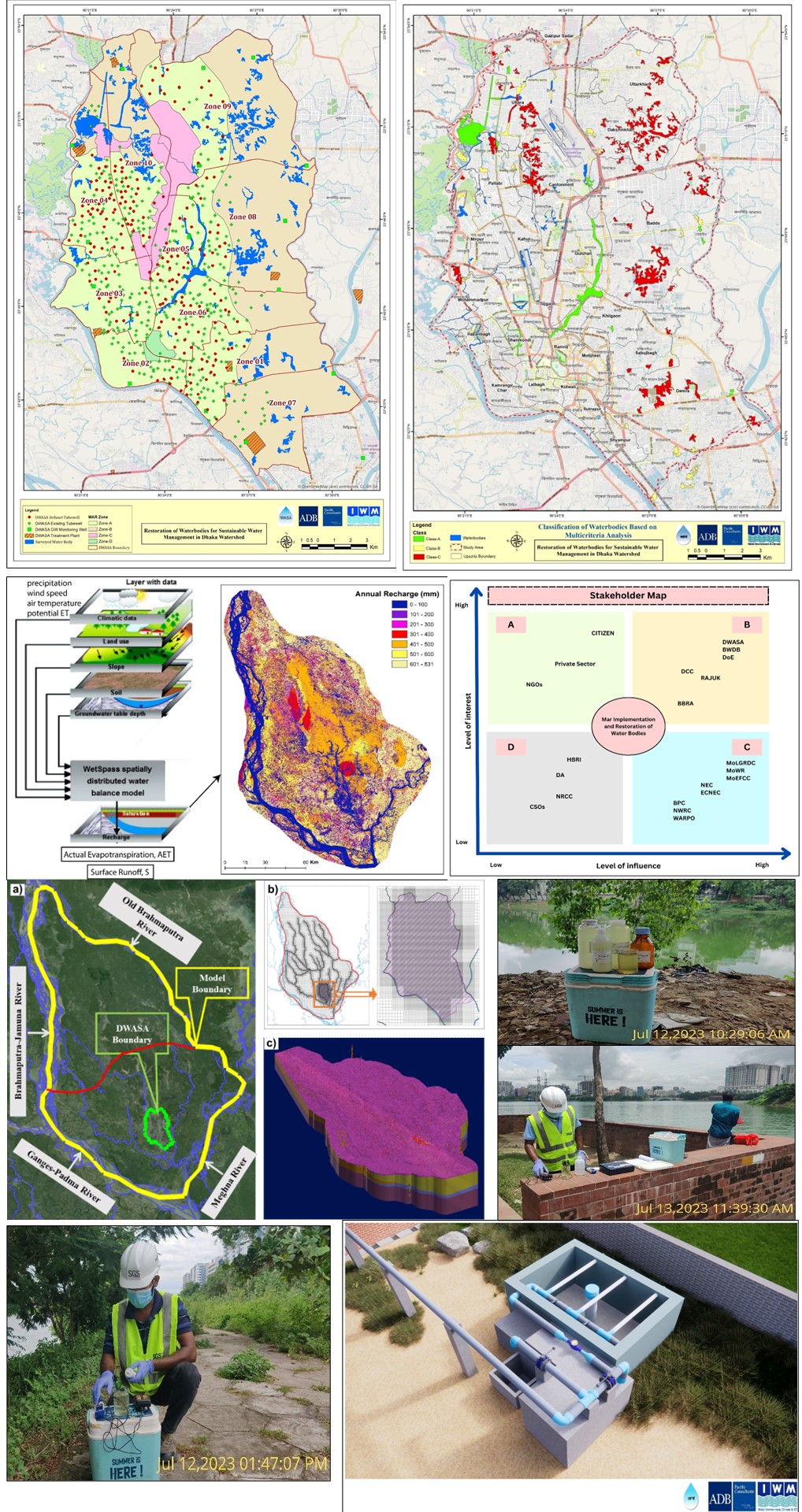
Gazipur City Corporation (GCC), established in January 2013, spans 329.53 square kilometers and accommodates nearly 2.5 million residents. The city’s infrastructure currently comprises 1,552 kilometers of roads, 670 kilometers of drains, and 552 culverts. However, these facilities were developed without an integrated plan, leaving many areas underserved. The absence of modern drainage systems has led to recurring waterlogging and traffic congestion during heavy rains, creating significant challenges for urban life and economic activity. With rapid urbanization and industrial expansion expected to continue, unplanned growth threatens to further intensify these problems. To address these pressing issues, GCC launched a major infrastructure development initiative, approved by the Executive Committee of the National Economic Council (ECNEC) in October 2018. The project includes the construction of 286 kilometers of internal roads, 136 kilometers of drains with footpaths, one kilometer of standalone footpaths, and five kilometers of retaining walls.
The Institute of Water Modelling (IWM) was engaged to carry out design review, cost estimation, and construction supervision across zones 1 to 5 of GCC. The assignment involved a comprehensive review of existing designs, pre‑ and post‑work surveys, and close supervision of construction activities. IWM ensured strict quality control of materials and verified as‑built drawings submitted by contractors to confirm compliance with approved designs and specifications.
Through its technical expertise and oversight, IWM played a pivotal role in ensuring that the infrastructure developed under this project is durable, efficient, and climate‑resilient. The initiative not only strengthens urban mobility but also enhances drainage capacity, reducing the risks of flooding and congestion. By improving the quality and reliability of civic infrastructure, the project contributes to a safer, more sustainable, and better‑connected urban environment for the rapidly growing population of Gazipur. This effort underscores GCC’s commitment to modernizing its infrastructure and highlights IWM’s role in delivering sustainable engineering solutions that support long‑term urban resilience and improved quality of life.
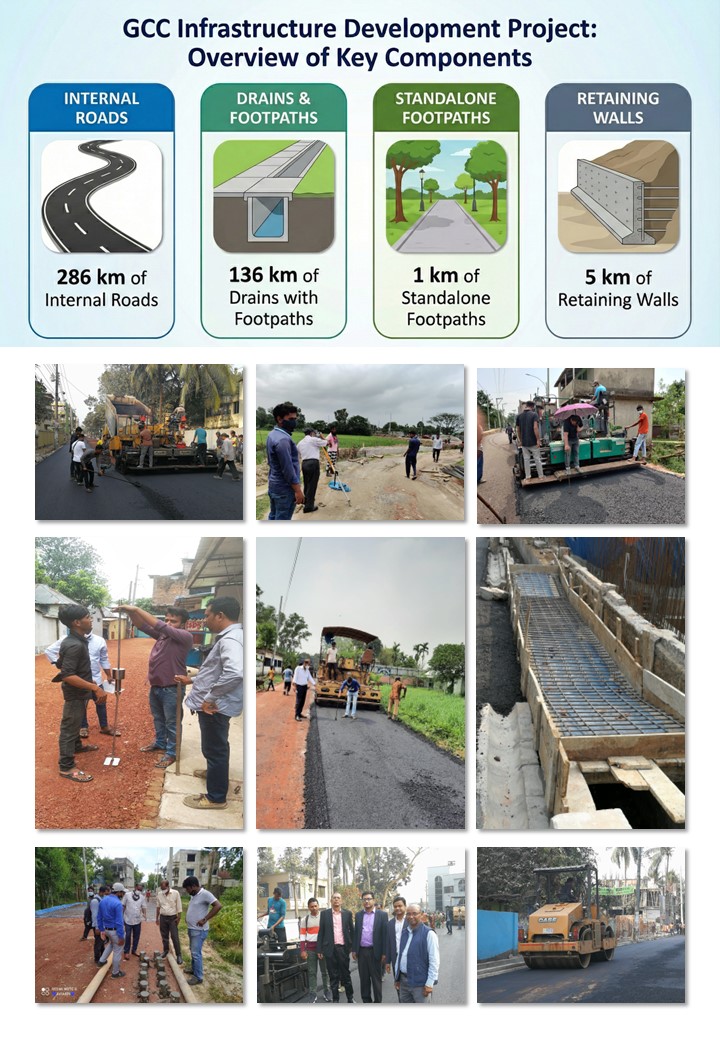
Our Core Team

Email: mkb@iwmbd.org
Mobile: 01841930025; 01940602030
Email: mmt@iwmbd.org
Mobile: 01913578027, 01677492702
Email: sig@iwmbd.org
Mobile: 01686799663, 01521434305
Email: srp@iwmbd.org
Mobile: 01713014460
Email: fam@iwmbd.org
Mobile: 01847189320
Email: jab@iwmbd.org
Mobile: 01715022141
Email: kmm@iwmbd.org
Mobile: 01711106001
Email: fab@iwmbd.org
Mobile: 01716480296
Email: mdl@iwmbd.org
Mobile: 01719351228
Email: hnk@iwmbd.org
Mobile: 01812383820
Email: raz@iwmbd.org
Mobile: 01737414337
Email: nsk@iwmbd.org
Mobile: 01756929741
Email: jnh@iwmbd.org
Mobile: 01738284121
Email: nrm@iwmbd.org
Mobile: 01911648698
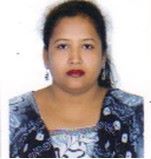
Email: myt@iwmbd.org
Mobile: 01726021110, 01810107228
Phone: 880-2-55087611-4